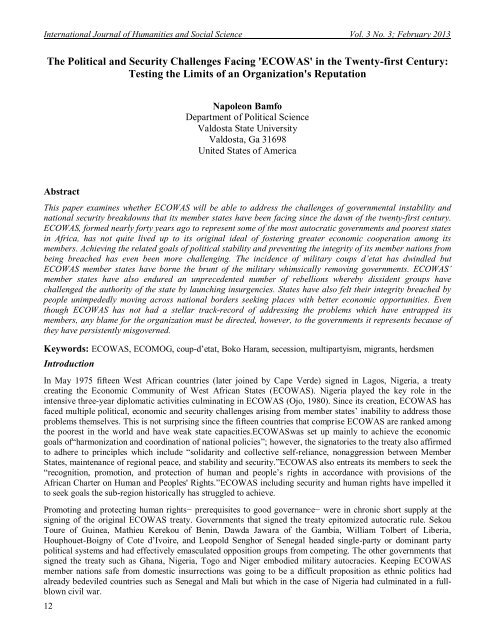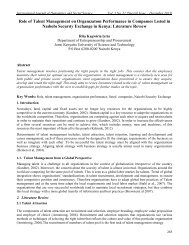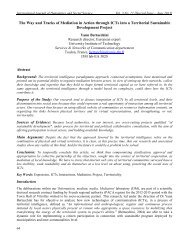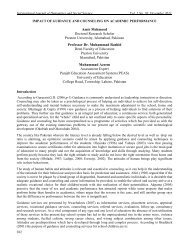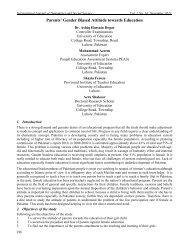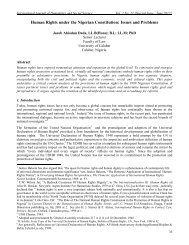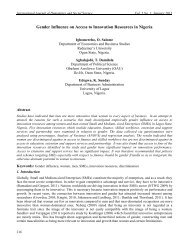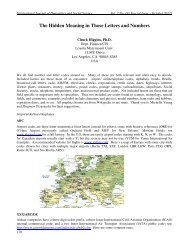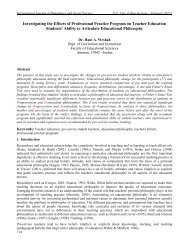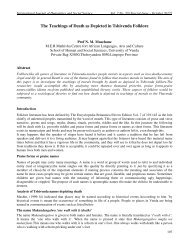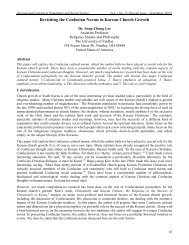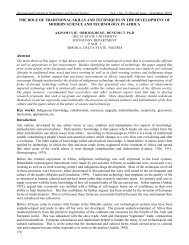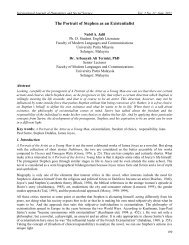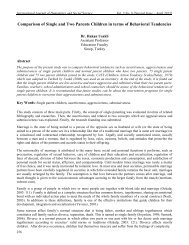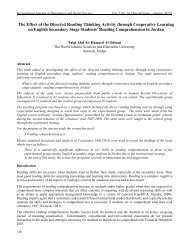The Political and Security Challenges Facing 'ECOWAS' in the ...
The Political and Security Challenges Facing 'ECOWAS' in the ...
The Political and Security Challenges Facing 'ECOWAS' in the ...
You also want an ePaper? Increase the reach of your titles
YUMPU automatically turns print PDFs into web optimized ePapers that Google loves.
International Journal of Humanities <strong>and</strong> Social Science Vol. 3 No. 3; February 2013<br />
<strong>The</strong> <strong>Political</strong> <strong>and</strong> <strong>Security</strong> <strong>Challenges</strong> <strong>Fac<strong>in</strong>g</strong> <strong>'ECOWAS'</strong> <strong>in</strong> <strong>the</strong> Twenty-first Century:<br />
Test<strong>in</strong>g <strong>the</strong> Limits of an Organization's Reputation<br />
Napoleon Bamfo<br />
Department of <strong>Political</strong> Science<br />
Valdosta State University<br />
Valdosta, Ga 31698<br />
United States of America<br />
Abstract<br />
This paper exam<strong>in</strong>es whe<strong>the</strong>r ECOWAS will be able to address <strong>the</strong> challenges of governmental <strong>in</strong>stability <strong>and</strong><br />
national security breakdowns that its member states have been fac<strong>in</strong>g s<strong>in</strong>ce <strong>the</strong> dawn of <strong>the</strong> twenty-first century.<br />
ECOWAS, formed nearly forty years ago to represent some of <strong>the</strong> most autocratic governments <strong>and</strong> poorest states<br />
<strong>in</strong> Africa, has not quite lived up to its orig<strong>in</strong>al ideal of foster<strong>in</strong>g greater economic cooperation among its<br />
members. Achiev<strong>in</strong>g <strong>the</strong> related goals of political stability <strong>and</strong> prevent<strong>in</strong>g <strong>the</strong> <strong>in</strong>tegrity of its member nations from<br />
be<strong>in</strong>g breached has even been more challeng<strong>in</strong>g. <strong>The</strong> <strong>in</strong>cidence of military coups d’etat has dw<strong>in</strong>dled but<br />
ECOWAS member states have borne <strong>the</strong> brunt of <strong>the</strong> military whimsically remov<strong>in</strong>g governments. ECOWAS’<br />
member states have also endured an unprecedented number of rebellions whereby dissident groups have<br />
challenged <strong>the</strong> authority of <strong>the</strong> state by launch<strong>in</strong>g <strong>in</strong>surgencies. States have also felt <strong>the</strong>ir <strong>in</strong>tegrity breached by<br />
people unimpededly mov<strong>in</strong>g across national borders seek<strong>in</strong>g places with better economic opportunities. Even<br />
though ECOWAS has not had a stellar track-record of address<strong>in</strong>g <strong>the</strong> problems which have entrapped its<br />
members, any blame for <strong>the</strong> organization must be directed, however, to <strong>the</strong> governments it represents because of<br />
<strong>the</strong>y have persistently misgoverned.<br />
Keywords: ECOWAS, ECOMOG, coup-d‟etat, Boko Haram, secession, multipartyism, migrants, herdsmen<br />
Introduction<br />
In May 1975 fifteen West African countries (later jo<strong>in</strong>ed by Cape Verde) signed <strong>in</strong> Lagos, Nigeria, a treaty<br />
creat<strong>in</strong>g <strong>the</strong> Economic Community of West African States (ECOWAS). Nigeria played <strong>the</strong> key role <strong>in</strong> <strong>the</strong><br />
<strong>in</strong>tensive three-year diplomatic activities culm<strong>in</strong>at<strong>in</strong>g <strong>in</strong> ECOWAS (Ojo, 1980). S<strong>in</strong>ce its creation, ECOWAS has<br />
faced multiple political, economic <strong>and</strong> security challenges aris<strong>in</strong>g from member states‟ <strong>in</strong>ability to address those<br />
problems <strong>the</strong>mselves. This is not surpris<strong>in</strong>g s<strong>in</strong>ce <strong>the</strong> fifteen countries that comprise ECOWAS are ranked among<br />
<strong>the</strong> poorest <strong>in</strong> <strong>the</strong> world <strong>and</strong> have weak state capacities.ECOWASwas set up ma<strong>in</strong>ly to achieve <strong>the</strong> economic<br />
goals of“harmonization <strong>and</strong> coord<strong>in</strong>ation of national policies”; however, <strong>the</strong> signatories to <strong>the</strong> treaty also affirmed<br />
to adhere to pr<strong>in</strong>ciples which <strong>in</strong>clude “solidarity <strong>and</strong> collective self-reliance, nonaggression between Member<br />
States, ma<strong>in</strong>tenance of regional peace, <strong>and</strong> stability <strong>and</strong> security.”ECOWAS also entreats its members to seek <strong>the</strong><br />
“recognition, promotion, <strong>and</strong> protection of human <strong>and</strong> people‟s rights <strong>in</strong> accordance with provisions of <strong>the</strong><br />
African Charter on Human <strong>and</strong> Peoples' Rights.”ECOWAS <strong>in</strong>clud<strong>in</strong>g security <strong>and</strong> human rights have impelled it<br />
to seek goals <strong>the</strong> sub-region historically has struggled to achieve.<br />
Promot<strong>in</strong>g <strong>and</strong> protect<strong>in</strong>g human rights− prerequisites to good governance− were <strong>in</strong> chronic short supply at <strong>the</strong><br />
sign<strong>in</strong>g of <strong>the</strong> orig<strong>in</strong>al ECOWAS treaty. Governments that signed <strong>the</strong> treaty epitomized autocratic rule. Sekou<br />
Toure of Gu<strong>in</strong>ea, Mathieu Kerekou of Ben<strong>in</strong>, Dawda Jawara of <strong>the</strong> Gambia, William Tolbert of Liberia,<br />
Houphouet-Boigny of Cote d‟Ivoire, <strong>and</strong> Leopold Senghor of Senegal headed s<strong>in</strong>gle-party or dom<strong>in</strong>ant party<br />
political systems <strong>and</strong> had effectively emasculated opposition groups from compet<strong>in</strong>g. <strong>The</strong> o<strong>the</strong>r governments that<br />
signed <strong>the</strong> treaty such as Ghana, Nigeria, Togo <strong>and</strong> Niger embodied military autocracies. Keep<strong>in</strong>g ECOWAS<br />
member nations safe from domestic <strong>in</strong>surrections was go<strong>in</strong>g to be a difficult proposition as ethnic politics had<br />
already bedeviled countries such as Senegal <strong>and</strong> Mali but which <strong>in</strong> <strong>the</strong> case of Nigeria had culm<strong>in</strong>ated <strong>in</strong> a fullblown<br />
civil war.<br />
12
© Centre for Promot<strong>in</strong>g Ideas, USA www.ijhssnet.com<br />
By <strong>the</strong> mid-1970s <strong>the</strong> countries that comprised ECOWAS were experienc<strong>in</strong>g <strong>the</strong> dysfuntionalities that build<strong>in</strong>g<br />
new nations usually entailed. This paper assesses whe<strong>the</strong>r ECOWAS s<strong>in</strong>ce its formation nearly forty years ago<br />
<strong>and</strong> more than one decade <strong>in</strong>to <strong>the</strong> new millennium has achieved <strong>the</strong> tw<strong>in</strong> goals of ensur<strong>in</strong>g political stability <strong>and</strong><br />
<strong>the</strong> security <strong>and</strong> <strong>in</strong>tegrity of its member countries „states assist charter sought.<br />
Countries <strong>in</strong> <strong>the</strong> West Africa subregion have been beset by some of <strong>the</strong> deepest developmental crises countries<br />
anywhere <strong>in</strong> <strong>the</strong> world face today. Evaluat<strong>in</strong>g ECOWAS‟ performance on political stability <strong>and</strong> national security<br />
<strong>the</strong>refore must recognize <strong>the</strong> many developmental challenges which are endemic to <strong>the</strong> region<strong>and</strong>, undoubtedly,<br />
have impeded <strong>the</strong> organization‟s effectiveness. <strong>The</strong>se problems <strong>in</strong>clude high levels of illiteracy <strong>and</strong><br />
nonperform<strong>in</strong>g bureaucracies, political corruption <strong>and</strong> <strong>in</strong>ept political leadership. By <strong>the</strong> depth of problems which<br />
a regional organization may be tasked to resolve, those ECOWAS faced surpass all. Each decade which<br />
ECOWAS has trod has come with its unique problems that have challenged <strong>the</strong> organization‟s viability <strong>and</strong> image<br />
as exemplar <strong>and</strong> worthy to be reckoned among <strong>the</strong> best <strong>in</strong> <strong>the</strong> world. Assess<strong>in</strong>g how successful ECOWAS has<br />
been s<strong>in</strong>ce its form<strong>in</strong>g by address<strong>in</strong>g <strong>the</strong> sub-region‟s problems concern<strong>in</strong>g politics <strong>and</strong> security <strong>in</strong> <strong>the</strong> new<br />
millennium, is an enquiry worth mak<strong>in</strong>g.<br />
1.1. <strong>The</strong> forces of union <strong>and</strong> disunion <strong>in</strong> West Africa<br />
A country may reap economic <strong>and</strong> political benefits from jo<strong>in</strong><strong>in</strong>g an association that <strong>in</strong>volves o<strong>the</strong>r countries that<br />
share identical characteristics ra<strong>the</strong>r than rely<strong>in</strong>g solely on its own resources. Such benefits <strong>in</strong>clude exp<strong>and</strong>ed<br />
markets <strong>and</strong> access to food <strong>and</strong> raw materials that a country may not or cannot produce itself. <strong>The</strong> governments of<br />
West Africa com<strong>in</strong>g toge<strong>the</strong>r as <strong>the</strong>y did represent<strong>in</strong>g <strong>the</strong>ir countries to sign ECOWAS‟ orig<strong>in</strong>al protocolhoped to<br />
lift <strong>the</strong> underperform<strong>in</strong>g economies from which countries <strong>in</strong> <strong>the</strong> region suffered.ECOWAS‟ orig<strong>in</strong>al article of<br />
<strong>in</strong>corporation was clear about offer<strong>in</strong>g <strong>the</strong>se economic advantages to its members. <strong>The</strong> preamble of <strong>the</strong> orig<strong>in</strong>al<br />
treaty states “<strong>the</strong>overrid<strong>in</strong>g need to encourage, foster, <strong>and</strong> accelerate <strong>the</strong> economic <strong>and</strong> social development of<br />
West African states <strong>in</strong> order to improve <strong>the</strong> liv<strong>in</strong>g st<strong>and</strong>ards of <strong>the</strong> people liv<strong>in</strong>g <strong>in</strong> <strong>the</strong> region.”Several decades<br />
before ECOWAS form<strong>in</strong>g, <strong>the</strong> people <strong>and</strong> groups <strong>in</strong> West Africa had traded with one ano<strong>the</strong>r <strong>and</strong> settled <strong>in</strong> l<strong>and</strong>s<br />
far beyond <strong>the</strong>ir places of birth without follow<strong>in</strong>g formal residency protocols.<br />
<strong>The</strong> ECOWAS treaty streaml<strong>in</strong>ed immigration <strong>and</strong> residency requirements for <strong>the</strong> citizens of member countries<br />
by remov<strong>in</strong>g formal barriers which countries had erected such as seek<strong>in</strong>g visas for entry. Sign<strong>in</strong>g <strong>the</strong> treaty<br />
symbolically bridged <strong>the</strong> chasm which had existed between Anglophone, Francophone, <strong>and</strong> Lusophone<br />
countries─ an <strong>in</strong>visible but palpable rift caused by <strong>the</strong> differ<strong>in</strong>g ideological <strong>and</strong> cultural perspectives <strong>the</strong> English,<br />
<strong>the</strong> French, <strong>and</strong> <strong>the</strong> Portuguese broughtadm<strong>in</strong>ister<strong>in</strong>g <strong>the</strong>ir colonies. <strong>The</strong>se different adm<strong>in</strong>istration perspectives<br />
have been <strong>the</strong> primary basis for trade <strong>and</strong> cultural exchanges among <strong>the</strong> countries of West Africa, as well as<br />
between West African countries <strong>and</strong> <strong>the</strong>ir former metropolitan masters. Great Brita<strong>in</strong>, Portugal <strong>and</strong> France to<br />
vary<strong>in</strong>g degrees have kept trade, diplomatic <strong>and</strong> cultural ties with <strong>the</strong>ir former colonies which have restricted<br />
thosecountries from committ<strong>in</strong>g <strong>the</strong>mselves fully to ECOWAS. Brita<strong>in</strong> was <strong>the</strong> most st<strong>and</strong>offish of <strong>the</strong> three<br />
major colonial powers as it only kept weaker trade ties with its former colonies. <strong>The</strong> Commonwealth of Nations<br />
has ameliorated this by promot<strong>in</strong>g stronger cultural ties. Apart from <strong>the</strong> biennial heads of state meet<strong>in</strong>g <strong>and</strong> sports<br />
competition, <strong>the</strong> former British colonies <strong>in</strong> Africa have cherished associat<strong>in</strong>g with <strong>the</strong> Commonwealth which <strong>the</strong>y<br />
consider a special bond.In no case did <strong>the</strong> former British colonies consider associat<strong>in</strong>g with Brita<strong>in</strong> a m<strong>in</strong>or<br />
<strong>in</strong>cident <strong>in</strong> <strong>the</strong>ir history; it everywhere left a last<strong>in</strong>g mark on <strong>in</strong>stitutions <strong>and</strong> thought (Brady, 1962).France, unlike<br />
Great Brita<strong>in</strong>, has kept strong economic <strong>and</strong> diplomatic ties with its former colonies.<br />
France saw its trusty allies <strong>in</strong> <strong>the</strong> heartl<strong>and</strong> of <strong>the</strong> defunct French West African <strong>and</strong> French Equatorial African<br />
Federation. Cote d‟Ivoire <strong>and</strong> Senegal stood out as <strong>the</strong> two countries whose leaders had political careers that were<br />
<strong>in</strong>timately <strong>in</strong>fluenced by French colonial policy.Stanil<strong>and</strong> (1987) quotes a French scholar observ<strong>in</strong>g that m<strong>in</strong>isters<br />
of French-speak<strong>in</strong>g African states made some 2,000 visits to Paris <strong>in</strong> an average year. Between 1960 <strong>and</strong> 1978,<br />
French <strong>and</strong> African presidents held 280 meet<strong>in</strong>gs, <strong>and</strong> Presidents de Gaulle, Pompidou, <strong>and</strong> Giscard d'Esta<strong>in</strong>g<br />
made 32 state visits to Africa. Cote d‟Ivoire had over 50,000 French citizens <strong>and</strong> Senegal over 20,000.France kept<br />
military bases <strong>and</strong> had defense arrangements provid<strong>in</strong>g for French <strong>in</strong>tervention <strong>in</strong> case of <strong>in</strong>ternal <strong>and</strong> external<br />
threat.Gu<strong>in</strong>ea Bissau <strong>and</strong> Cape Verde jo<strong>in</strong><strong>in</strong>g ECOWAS <strong>in</strong> 1976 soon after <strong>in</strong>dependence signified <strong>the</strong> spirit<br />
which made West African countries to form <strong>the</strong> organization. Portugal had left its former colonies <strong>in</strong> disarray<br />
follow<strong>in</strong>g several years of war that left those colonies lack<strong>in</strong>g <strong>in</strong> qualified manpower <strong>and</strong> <strong>in</strong>frastructure.<br />
13
International Journal of Humanities <strong>and</strong> Social Science Vol. 3 No. 3; February 2013<br />
<strong>The</strong>se peculiarities which each ECOWAS member brought <strong>in</strong>to <strong>the</strong> union: <strong>the</strong> different cultural perspectives<br />
among Francophone, Anglophone, <strong>and</strong> Lusophone countries; <strong>the</strong> different climatic endowments of countries, <strong>the</strong><br />
unbridled movement of people across national boundaries, <strong>and</strong> <strong>the</strong> misgovernance which has characterized <strong>the</strong><br />
political leadership <strong>in</strong> West Africa have affected ECOWAS capability to achieve its goal of political, economic,<br />
<strong>and</strong> security sufficiency.<br />
2.1.<strong>Political</strong> <strong>in</strong>stability<br />
Countries of West Africa have been among <strong>the</strong> most politically unstable <strong>in</strong> Africa. From 1960 until <strong>the</strong> early<br />
1990s those governments had not been <strong>in</strong>terested <strong>in</strong> keep<strong>in</strong>g systems which allowed multiple political parties to<br />
coexist <strong>and</strong> compete for <strong>the</strong>ir share of electorate <strong>in</strong> elections. <strong>The</strong> competition that parties br<strong>in</strong>g <strong>in</strong>to politics as<br />
<strong>the</strong>y try to persuade <strong>the</strong> electorate to elect <strong>the</strong>m <strong>in</strong>to power opens up o<strong>the</strong>rwise closed political systems to<br />
scrut<strong>in</strong>yasit forces <strong>the</strong> partiesto lay out clearer manifestoes. <strong>The</strong> abuses like imprisonments, disappearances, house<br />
detentions, forced exiles <strong>and</strong> even deaths which became rampant under s<strong>in</strong>gle-party systems might have been<br />
ameliorated as opposition parties equally driven by a strong zeal for power would have exposed those abuses. In<br />
every newly-<strong>in</strong>dependent African country, civilians had <strong>the</strong> first opportunity to rule but corruption,<br />
mismanagement, <strong>and</strong> leaders <strong>and</strong> <strong>the</strong>ir parties aggr<strong>and</strong>iz<strong>in</strong>g power caught <strong>the</strong> attention of <strong>the</strong> military to step <strong>in</strong>,<br />
ostensibly to stop <strong>the</strong> wayward direction <strong>the</strong> new nations were head<strong>in</strong>g.<br />
After <strong>in</strong>dependence was achieved, <strong>the</strong> people of Africa‟s new nations had high expectations about government<br />
moderniz<strong>in</strong>g <strong>the</strong>ir nations <strong>and</strong> improve liv<strong>in</strong>g st<strong>and</strong>ards by provid<strong>in</strong>g small conveniences such as schools,<br />
hospitals, clean water, health-care, education <strong>and</strong> prevent communicable diseases from spread<strong>in</strong>g. <strong>The</strong>se<br />
expectations were never realized as governments lack<strong>in</strong>g money to undertake developmental projects <strong>and</strong> be<strong>in</strong>g<br />
unable to attract economic aid from donors created a huge deficit <strong>in</strong> <strong>the</strong> trust people had for government <strong>and</strong> its<br />
ability to h<strong>and</strong>le <strong>the</strong> challenges of <strong>the</strong> future. Want<strong>in</strong>g to keep power but also apprehensive that people‟s deflated<br />
expectations would cost <strong>the</strong>m elections, leaders found ways to elim<strong>in</strong>ate political competition by nullify<strong>in</strong>g <strong>the</strong><br />
section of constitutions that allowed multiparty governance. Ghana <strong>and</strong> Gu<strong>in</strong>ea, two of sub-Saharan Africa<br />
countries to get <strong>in</strong>dependence early, also became <strong>the</strong> first to outlaw multiparty governance by adopt<strong>in</strong>g s<strong>in</strong>gleparty<br />
systems.Ghana‟s rul<strong>in</strong>g Convention People‟s Party (CPP) passed <strong>the</strong> Preventive Detention Act <strong>in</strong> 1958 <strong>and</strong><br />
<strong>the</strong> Republican Constitution of 1960 restricted political parties o<strong>the</strong>r than <strong>the</strong> CPP from operat<strong>in</strong>g. Gu<strong>in</strong>ea passed<br />
its own Preventive Detention Act <strong>in</strong> 1959, followed by a ban on <strong>the</strong> activities of political parties o<strong>the</strong>r than <strong>the</strong><br />
Parti démocratique de Gu<strong>in</strong>ée (PGI). O<strong>the</strong>r countries <strong>in</strong> <strong>the</strong> subregion such as Cote d‟Ivoire, Mali, Senegal <strong>and</strong><br />
Liberia followed suit by pass<strong>in</strong>g s<strong>in</strong>gle-party laws or mak<strong>in</strong>g <strong>the</strong> rul<strong>in</strong>g party so strong it emasculated m<strong>in</strong>or<br />
parties from compet<strong>in</strong>g. Carter (1962:2) claims one-party control was associated not only with dictatorial but also<br />
with quasi or full totalitarian rule.<br />
Leaders presented s<strong>in</strong>gle-party rule as <strong>the</strong> only choice that would have a stabiliz<strong>in</strong>g <strong>in</strong>fluence on Africa‟s new<br />
nations whose ethnic groups could tear <strong>the</strong> state apart because of partisan politics. Opposition parties believed, on<br />
<strong>the</strong> o<strong>the</strong>r h<strong>and</strong>, that leaders‟ proscrib<strong>in</strong>g o<strong>the</strong>r parties was noth<strong>in</strong>g more than a ploy to tighten <strong>the</strong> rul<strong>in</strong>g party‟s<br />
grip on power. Leaders mov<strong>in</strong>g to ban opposition groups <strong>in</strong>variably attracted <strong>the</strong> military to step <strong>in</strong>to politics.<br />
Esterhuysen‟s (1992), table of military coups <strong>in</strong> Africa shows no less than thirty-three military coups occurr<strong>in</strong>g <strong>in</strong><br />
West Africa from 1960 to 1991. <strong>The</strong> military that brazenly <strong>and</strong> self-righteously overthrew civilian governments,<br />
ironically, also became entangled <strong>in</strong> <strong>the</strong> same dysfuntionalities which <strong>the</strong>y had accused <strong>the</strong> former governments<br />
for creat<strong>in</strong>g. Coup makers entrench<strong>in</strong>g <strong>the</strong>mselves <strong>in</strong> power attracted o<strong>the</strong>r military personnel to <strong>in</strong>tervene by<br />
remov<strong>in</strong>g <strong>the</strong> first group of military rulers. Military coups soon became a contagion (David <strong>and</strong> Lutz, 1974), as<br />
military governments fell victim to <strong>in</strong>trigue that came with<strong>in</strong> <strong>the</strong>ir own ranks. Only a h<strong>and</strong>ful of military leaders<br />
<strong>in</strong>clud<strong>in</strong>g Moumar Gaddafi of Libya, Mengistu Haile Mariam of Ethiopia, Siad Barre of Somalia <strong>and</strong> Gnass<strong>in</strong>gbe<br />
Eyadema of Togo enjoyed longevity <strong>in</strong> <strong>the</strong>ir rule because <strong>the</strong>y successfully suppressed opposition groups by us<strong>in</strong>g<br />
extreme brutal methods.From <strong>the</strong> mid-1960s, <strong>in</strong>stability came to symbolize African politics as civilians <strong>and</strong><br />
military personnel jostled to get an edgeon rul<strong>in</strong>g.<br />
2.1.1.<strong>Security</strong> challenges<br />
Countries of ECOWAS have faced some of <strong>the</strong> most daunt<strong>in</strong>g security challenges any region <strong>in</strong> Africa has had<br />
especially from civil wars. Like <strong>the</strong> rest of Africa <strong>the</strong> countries <strong>in</strong> West Africa seldom go to war with <strong>the</strong>ir<br />
neighborsdespite Africa hav<strong>in</strong>g some <strong>in</strong>famous irredentist wars.<br />
14
© Centre for Promot<strong>in</strong>g Ideas, USA www.ijhssnet.com<br />
<strong>The</strong> war between Somalia <strong>and</strong> Ethiopia over <strong>the</strong> Ogaden <strong>in</strong> 1977, between Ethiopia <strong>and</strong> Eritrea <strong>in</strong> 1998, Libya<br />
<strong>and</strong> Chad over <strong>the</strong> Aouzou Strip, <strong>and</strong> Libya‟s border <strong>in</strong>cursions <strong>in</strong>to Egypt <strong>in</strong> 1977 were among <strong>the</strong> <strong>in</strong>famous.<br />
West African countries have avoided go<strong>in</strong>g to war because <strong>the</strong>y have realized that<strong>the</strong> benefits accru<strong>in</strong>g from<br />
go<strong>in</strong>g to war is <strong>in</strong>consequential compared to <strong>the</strong> f<strong>in</strong>ancial <strong>and</strong> human cost of wag<strong>in</strong>g that war. It was not<br />
surpris<strong>in</strong>g, <strong>the</strong>refore, that dur<strong>in</strong>g Nigeria‟s <strong>and</strong> Cameroon‟s bitter disputation over Bakassi which is s<strong>and</strong>wiched<br />
between sou<strong>the</strong>astern Nigeria <strong>and</strong> southwestern Cameroon <strong>the</strong>y avoided mobiliz<strong>in</strong>g troops for war. <strong>The</strong> two<br />
countries relied on <strong>the</strong> International Court of Justice‟s mediation to settle <strong>the</strong> dispute (Anyu, 2007).Chad has also<br />
had a large chunk of its territory, about 25,000 square miles, <strong>in</strong> disputation with Libya <strong>and</strong> has also had disputes<br />
along <strong>the</strong> Chad-Niger <strong>and</strong> Niger-Nigeria border. <strong>The</strong> number of disputed boundaries between countries <strong>in</strong> West<br />
Africa has been remarkably small, despite <strong>the</strong> several thous<strong>and</strong> miles of l<strong>and</strong> between national borders. Zartman<br />
(1965) expla<strong>in</strong>ed <strong>the</strong> absence of war was due to <strong>the</strong> African state be<strong>in</strong>g still <strong>in</strong> a state of becom<strong>in</strong>g; <strong>the</strong>refore,<br />
effective government control of <strong>the</strong>ir borders had not yet become coterm<strong>in</strong>ous with <strong>the</strong> limits of <strong>the</strong> state. He<br />
predicted, however, that disputes would become more frequent <strong>in</strong> <strong>the</strong> future as <strong>the</strong> frontier zones became<br />
demarcated.<strong>The</strong>re have been <strong>in</strong>stances; however, when neighbor<strong>in</strong>g countries had provided a safe haven for<br />
émigrés that engage <strong>in</strong> acts of sabotage aga<strong>in</strong>st <strong>the</strong>ir home government across <strong>the</strong> border. Dur<strong>in</strong>g Eyadema‟s long<br />
reign over Togo, he periodically accused Ghanaian governments of provid<strong>in</strong>g shelter <strong>and</strong> support for renegade<br />
groups plann<strong>in</strong>g his government‟s overthrow. <strong>The</strong> Senegalese government has periodically launched raids aga<strong>in</strong>st<br />
Casamance separatists <strong>and</strong> pushed both rebels <strong>and</strong> civilians to seek refuge <strong>in</strong> neighbor<strong>in</strong>g Gu<strong>in</strong>ea Bissau. Evans‟<br />
(2009) study shows that villagers <strong>and</strong> rebels return<strong>in</strong>g to exploit <strong>the</strong>ir former habitable <strong>and</strong> agricultural spaces<br />
when security improved never found life easy because <strong>the</strong>y felt <strong>in</strong>secure from not know<strong>in</strong>g when <strong>the</strong> Senegalese<br />
government would launch reprisal raids.<br />
2.1.2. <strong>The</strong> major security problem that cont<strong>in</strong>ues to threaten West African countries has been <strong>in</strong>ternal squabbles<br />
break<strong>in</strong>g out among ethnic groups or between regions or ethnic groups with <strong>the</strong> central government over policy. A<br />
region or a group‟s disagreement with government often has been about feel<strong>in</strong>g cheated by <strong>the</strong> manner <strong>in</strong> which<br />
government divides budget revenues, whereby a resource-rich region suspects <strong>the</strong> government divert<strong>in</strong>g revenues<br />
away to poorly endowed regions. <strong>The</strong> shortage of money for governments to allot to regions as well as<br />
governments‟ prebendalism whichJoseph (1987) describes as <strong>the</strong> sense of entitlement that many public officials<br />
<strong>and</strong> private citizens felt <strong>the</strong>y had to <strong>the</strong> revenues of <strong>the</strong> Nigerian government has been a cause. Militias<br />
specializ<strong>in</strong>g <strong>in</strong> kidnapp<strong>in</strong>g oil workers <strong>and</strong> v<strong>and</strong>aliz<strong>in</strong>g oil <strong>in</strong>frastructure has been a common form of protest<br />
aga<strong>in</strong>st marg<strong>in</strong>alization by <strong>the</strong> state <strong>and</strong> transnational oil corporations <strong>in</strong> Nigeria‟s Niger Delta region. <strong>The</strong><br />
Movement for <strong>the</strong> Emancipation of <strong>the</strong> Niger Delta (MEND) has become an umbrella group spearhead<strong>in</strong>g <strong>the</strong>se<br />
kidnapp<strong>in</strong>gs. A study by Haggerty <strong>and</strong> Temitope (2011) assert that <strong>in</strong>surgents seek to portray <strong>the</strong> situation <strong>in</strong> <strong>the</strong><br />
Niger Delta as a form of war, <strong>and</strong> oil workers as enemy combatants, <strong>and</strong> use this metaphor of war to frame <strong>the</strong>ir<br />
violent actions as a form of justifiable repertoire of protest. Lewis (1996) describes <strong>the</strong> military governments of<br />
Babangida <strong>and</strong> Abacha <strong>in</strong> Nigeria from 1985 to 1994 as prebendal toward predation that “reflected a new<br />
tendency which allowed a s<strong>in</strong>gle ruler <strong>and</strong> <strong>the</strong> military elite to arbitrarily control power by employ<strong>in</strong>g a mixture of<br />
coercion <strong>and</strong> material <strong>in</strong>ducement.” Conflict also has occurred among groups about <strong>the</strong>ir disenchantment with<br />
residents from o<strong>the</strong>r regions <strong>and</strong> it<strong>in</strong>erant traders who move <strong>in</strong>to <strong>the</strong>ir community. It<strong>in</strong>erant farmers also have run<br />
<strong>in</strong>to resistance from local farmers who may compla<strong>in</strong> about <strong>the</strong> nonnative farmers encroach<strong>in</strong>g on <strong>the</strong>ir l<strong>and</strong>.<br />
2.1.3. Religion has been a constant source of discontent between locals who f<strong>in</strong>d <strong>the</strong> religious doctr<strong>in</strong>e <strong>and</strong><br />
norms immigrants br<strong>in</strong>g to <strong>the</strong>ir community detestable. <strong>The</strong> followers of <strong>the</strong> two dom<strong>in</strong>ant religions of West<br />
Africa, Christianity <strong>and</strong> Islam, have often clashed <strong>in</strong>side <strong>the</strong>ir communities over doctr<strong>in</strong>e <strong>and</strong> lifestyle. <strong>The</strong><br />
coastal regions of some West African countries are chiefly Christian <strong>and</strong> have richer arable l<strong>and</strong>, schools, <strong>and</strong><br />
<strong>in</strong>dustry. <strong>The</strong>se sou<strong>the</strong>rn regions historically have attracted it<strong>in</strong>erant families, usually daily laborers <strong>and</strong> cattle<br />
herders from <strong>the</strong> north who are chiefly Muslim, look<strong>in</strong>g for work. Clashes have occurred <strong>in</strong> several countries <strong>in</strong><br />
West Africa <strong>and</strong> have few encourag<strong>in</strong>g signs of subsid<strong>in</strong>g. Cote d‟Ivoire <strong>and</strong> Nigeria have borne <strong>the</strong> brunt of such<br />
religious conflicts. Cote d‟Ivoire‟s civil war of 2002 was sparked by sou<strong>the</strong>rn Ivorian leaders who were Christian<br />
try<strong>in</strong>g to disqualify a nor<strong>the</strong>rn c<strong>and</strong>idate from contest<strong>in</strong>g <strong>in</strong> <strong>the</strong> presidential elections com<strong>in</strong>g up. <strong>The</strong> result<strong>in</strong>g<br />
war split <strong>the</strong> country <strong>in</strong>to halves between a Muslim north <strong>and</strong> a Christian south. Nordås‟ (2008) study of Ghana<br />
<strong>and</strong> Cote d‟Ivoire reveals that even though Cote d'Ivoire's neighbor Ghana is situated on <strong>the</strong> same 'civilizational<br />
fault l<strong>in</strong>e' between a Muslim nor<strong>the</strong>rn part <strong>and</strong> a Christian south, no violent north-south mobilization has<br />
occurred.<br />
15
International Journal of Humanities <strong>and</strong> Social Science Vol. 3 No. 3; February 2013<br />
<strong>The</strong> two cases clearly show that <strong>the</strong> existence of a religious divide, <strong>in</strong> <strong>and</strong> of itself, does not predeterm<strong>in</strong>e<br />
bloodshed, but political strategies, religious concentration <strong>and</strong> re<strong>in</strong>forc<strong>in</strong>g cleavages can act as <strong>in</strong>terven<strong>in</strong>g<br />
variables that help expla<strong>in</strong> <strong>the</strong> difference <strong>in</strong> result. In Nigeria <strong>the</strong> hostility between Muslims <strong>and</strong> Christians has<br />
<strong>in</strong>tensified s<strong>in</strong>ce <strong>the</strong> early 1980s. From 1982, a violent confrontation between a Muslim sect under Alhaji<br />
Muhammadu Maroua, popularly known as <strong>the</strong> Maitats<strong>in</strong>e, <strong>and</strong> <strong>the</strong> police <strong>in</strong> Maiduguri began. <strong>The</strong> Maitats<strong>in</strong>e<br />
were part of a movement to create an Islamic state <strong>in</strong> <strong>the</strong> region. This Islamic revival attracted <strong>the</strong> attention of<br />
students, peasants, <strong>and</strong> <strong>the</strong> urban poor. <strong>The</strong> government responded to this political threat by provok<strong>in</strong>g a<br />
confrontation <strong>in</strong> which <strong>the</strong> police killed hundreds of <strong>the</strong> Maitats<strong>in</strong>e (Hickey, 1984). <strong>The</strong> newest radical<br />
organization, Boko Haram, whose philosophy, organizational plann<strong>in</strong>g, <strong>and</strong> modus oper<strong>and</strong>i is Taliban, however,<br />
has carried out <strong>the</strong> most ferocious <strong>and</strong> devastat<strong>in</strong>g attacks on Nigerians than any o<strong>the</strong>r group (Ali et al, 2012).<br />
Beg<strong>in</strong>n<strong>in</strong>g from 2009, Nigeria has been destabilized by large scale <strong>and</strong> unimag<strong>in</strong>able bomb attacks by <strong>the</strong> Boko<br />
Haram movement. Although Boko Haram can be compared by philosophy <strong>and</strong> by objectives to <strong>the</strong> Maitats<strong>in</strong>e<br />
sectarian group, its organizational plann<strong>in</strong>g, armed resistance, <strong>and</strong> modus oper<strong>and</strong>i is Taliban <strong>and</strong> attacks carried<br />
out by <strong>the</strong> groups so far <strong>the</strong> most ferocious <strong>and</strong> devastat<strong>in</strong>g. Boko Haram attacks which at first was conf<strong>in</strong>ed to<br />
North-Eastern Nigeria, has spread to <strong>the</strong> North-Central <strong>and</strong> spread<strong>in</strong>g even to Sou<strong>the</strong>rn Nigeria.<br />
2.1.4. Civil wars such as those which occurred <strong>in</strong> Cote d‟Ivoire <strong>in</strong> 2010, Liberia <strong>in</strong> 1989, <strong>and</strong> Sierra Leone <strong>in</strong><br />
1991, <strong>and</strong> Nigeria <strong>in</strong> 1967, by far, have exacted much violence. <strong>The</strong>se wars had several causes rang<strong>in</strong>g from <strong>the</strong><br />
cultural <strong>and</strong> economic to <strong>the</strong> political, <strong>and</strong> wrought <strong>in</strong>calculable harm on <strong>the</strong> people who were directly or<br />
<strong>in</strong>directly affected by those wars. As Nafziger (1972) recalls, <strong>the</strong> Nigerian civil war was caused by a series of<br />
<strong>in</strong>terconnected events which began soon after <strong>in</strong>dependence <strong>in</strong> 1960 that threatened to dissolve <strong>the</strong> republic. <strong>The</strong>y<br />
<strong>in</strong>clude disput<strong>in</strong>g <strong>the</strong> enumeration of <strong>the</strong> population by region for federal parliamentary representation as well as<br />
<strong>the</strong> military <strong>in</strong>tervention of 1966 spearheaded by young Ibo officers <strong>in</strong> which several prom<strong>in</strong>ent politicians were<br />
killed. Civil wars <strong>in</strong> West Africa have lasted vary<strong>in</strong>g lengths with <strong>the</strong> latest, <strong>the</strong> Ivorian civil war of 2010, last<strong>in</strong>g<br />
only a few months. <strong>The</strong> Nigerian civil war lasted from 1967 to 1970, <strong>the</strong> Sierra Leonean from 1991 to 1997, <strong>and</strong><br />
<strong>the</strong> Liberian from 1989 to 2003. ECOWAS acknowledges that its peacekeep<strong>in</strong>g activities <strong>in</strong> <strong>the</strong> 1990s were<br />
dom<strong>in</strong>ated by efforts to end <strong>the</strong> civil war <strong>in</strong> Liberia through <strong>in</strong>volv<strong>in</strong>g ECOMOG (ECOWAS Cease-Fire<br />
Monitor<strong>in</strong>g Group). <strong>The</strong> Ivorian civil war which began <strong>in</strong> late 2010 followed that country‟s earlier war of 2002<br />
<strong>and</strong> its <strong>in</strong>conclusive peace. <strong>The</strong> first Cote d‟Ivoire conflict was largely driven by political <strong>and</strong> social grievances<br />
over citizenship (Bah, 2010), <strong>and</strong> <strong>the</strong> second disputation over who won <strong>the</strong> presidential elections of that year.<br />
ECOWAS mobilized soldiers from Ghana, Togo, Ben<strong>in</strong>, Niger <strong>and</strong> Senegal for $1.8 million a month to help<br />
4,000 French troops to keep <strong>the</strong> peace <strong>in</strong> <strong>the</strong> first civil war. ECOWAS had planned us<strong>in</strong>g 3,200 troops, but settled<br />
for 1,400 when donor countries failed to give all <strong>the</strong> fund<strong>in</strong>g <strong>the</strong>y had promised (“Cote d‟Ivoire,” 2003).<br />
3.I. ECOWAS’ superstructure<br />
ECOWAS, undoubtedly, has followed <strong>the</strong> European Union‟s model which methodically moved from an economic<br />
to a political union as it tagged on supplemental treatiestoits Union‟s orig<strong>in</strong>al protocol. <strong>The</strong> 1960 Rome Treaty<br />
provided for establish<strong>in</strong>g a common market, a customs union <strong>and</strong> common policies. ECOWAS‟ orig<strong>in</strong>al treaty set<br />
up eight „technical committees‟ of which Trade, Customs, Taxation, Statistics, Money <strong>and</strong> Payments was one.<br />
This committee seemed well-suited for its primary task of promot<strong>in</strong>g trade among ECOWAS member countries.<br />
Ano<strong>the</strong>r technical committee, <strong>the</strong> <strong>Political</strong>, Judicial <strong>and</strong> Legal Affairs, Regional <strong>Security</strong> <strong>and</strong> Immigration, was<br />
also deemed essential <strong>in</strong> mak<strong>in</strong>g sure <strong>the</strong> organization lived up to <strong>the</strong> political <strong>and</strong> legal changes <strong>and</strong> <strong>the</strong><br />
immigration challenges which <strong>the</strong> region was fac<strong>in</strong>g. Like <strong>the</strong> European Union us<strong>in</strong>g <strong>the</strong> 1992 Maastricht Treaty<br />
to prepare <strong>the</strong> organization for <strong>the</strong> new challenges it would face such as a monetary union <strong>and</strong> citizenship,<br />
ECOWAS adopted a new treaty <strong>in</strong> 1993 extend<strong>in</strong>g economic <strong>and</strong> political cooperation among member states <strong>and</strong><br />
stated achiev<strong>in</strong>g a common market <strong>and</strong> a s<strong>in</strong>gle currency as major economic objectives.<br />
3.1.1. Thrust <strong>in</strong> a politically unstable region, ECOWAS has sought to mediate member countries‟ <strong>in</strong>ternal<br />
conflicts <strong>and</strong> disputesbetween countries. <strong>The</strong> first move <strong>the</strong> organization made <strong>in</strong> that regard was by adopt<strong>in</strong>g a<br />
Protocol Relat<strong>in</strong>g to Non-Aggression (PNA) <strong>in</strong> 1978 <strong>in</strong> Lagos, Nigeria, which forbade member states from<br />
threaten<strong>in</strong>g <strong>and</strong> us<strong>in</strong>g force of aggression aga<strong>in</strong>st one ano<strong>the</strong>r. A later Protocol Relat<strong>in</strong>g to Mutual Assistance on<br />
Defense (PMAD) was signed <strong>in</strong> Freetown, Sierra Leone on May 1981 <strong>and</strong> became effective five years later. <strong>The</strong><br />
ECOWAS Summit of December 1999 signed a Protocol for <strong>the</strong> Establishment of a Mechanism for Conflict<br />
Prevention, Management <strong>and</strong> Resolution, Peace <strong>and</strong> <strong>Security</strong>.<br />
16
© Centre for Promot<strong>in</strong>g Ideas, USA www.ijhssnet.com<br />
<strong>The</strong> Mechanism set up a Council of Elders, as well as a <strong>Security</strong> <strong>and</strong> Mediation Council. In October 1999,<br />
Ecowas decided to set up a Court of Justice follow<strong>in</strong>g a two-day meet<strong>in</strong>g of Justice M<strong>in</strong>isters <strong>in</strong> Abuja. <strong>The</strong> court<br />
addresses compla<strong>in</strong>ts from member states <strong>and</strong> <strong>in</strong>stitutions of <strong>the</strong> organization. In May 2002, <strong>the</strong> ECOWAS<br />
parliament convened <strong>the</strong> first time with 115 members <strong>and</strong>its membership weighted accord<strong>in</strong>g to population. In<br />
1990, <strong>the</strong> Economic Community of West African States Monitor<strong>in</strong>g Group (ECOMOG) was set up by ECOWAS<br />
member states as a non-st<strong>and</strong><strong>in</strong>g military force consist<strong>in</strong>g of l<strong>and</strong>, sea <strong>and</strong> air units (Khobe, 2000). ECOMOG‟s<br />
operations started <strong>in</strong> Liberia to prevent Charles Taylor‟sNational Patriotic Front of Liberia (NPFL) overthrow<strong>in</strong>g<br />
<strong>the</strong> unpopular government of President Samuel Doe. Doe called on <strong>the</strong> Community for help.<br />
<strong>The</strong> unend<strong>in</strong>gly dire f<strong>in</strong>ancial circumstance ECOWAS members face has affected <strong>the</strong> capacity of those member<br />
states to support <strong>the</strong> organization to carry out its security <strong>and</strong> peacekeep<strong>in</strong>g functions that need heavy<br />
expenditures. ECOWAS, <strong>the</strong>refore, has relied on <strong>the</strong> United Nations, <strong>the</strong> European Union, <strong>the</strong> AU <strong>and</strong> sovereign<br />
states such as <strong>the</strong> United States <strong>and</strong> France <strong>and</strong> o<strong>the</strong>r European countries for relief. Besides, <strong>the</strong> United Nations<br />
has cooperated with ECOWAS <strong>in</strong> peacekeep<strong>in</strong>g operations under <strong>the</strong> so-called „re-hatt<strong>in</strong>g‟ program <strong>in</strong> Sierra<br />
Leone, Liberia <strong>and</strong> Côte d‟Ivoire. Re-hatt<strong>in</strong>g has allowed regional or mult<strong>in</strong>ational forces to operate <strong>and</strong> <strong>the</strong>nto be<br />
followed by a UN peacekeep<strong>in</strong>g force. Under <strong>the</strong>se agreements, <strong>the</strong> United Nations reimbursed <strong>the</strong> West African<br />
countries contribut<strong>in</strong>g to ECOWAS peacekeep<strong>in</strong>g for <strong>the</strong> personnel, equipment <strong>and</strong> services <strong>the</strong>y provided (“Rehatt<strong>in</strong>g”,<br />
2005). In 1990, when it found its strategic <strong>in</strong>terest <strong>in</strong> Liberia threatened, <strong>the</strong> United States navy set off to<br />
<strong>the</strong> coast of Liberia to evacuate American citizens. <strong>The</strong> United States navy repeated a similar gesture <strong>in</strong> 2003<br />
follow<strong>in</strong>g <strong>the</strong> fall of Charles Taylor, <strong>the</strong> president of Liberia. This time, <strong>the</strong> United States deployed three warships<br />
off <strong>the</strong> coast <strong>and</strong> provided $10 million to fund peacekeep<strong>in</strong>g operations (“Liberia,” 2003).<br />
4. Assessment<br />
4.1. Good governance<br />
Although ECOWAS was set up ma<strong>in</strong>ly as an economic union to promote trade among member countries <strong>and</strong> reap<br />
<strong>the</strong> o<strong>the</strong>r benefits associated with cooperat<strong>in</strong>g such as a freer movement of people <strong>and</strong> exchange of expertise<br />
across <strong>the</strong> region, <strong>the</strong> region‟s poorly perform<strong>in</strong>g economies have had debilitat<strong>in</strong>g effects on political stability <strong>and</strong><br />
national security. Despite multifarious trade <strong>and</strong> security alliances which member countries have with former<br />
metropolitan powers, ECOWAS has been resilient. Member states such as Niger, Mali <strong>and</strong> Burk<strong>in</strong>a Faso<br />
haveexperienced devastat<strong>in</strong>g economic hardship s<strong>in</strong>ce <strong>the</strong> late 1970s but have rema<strong>in</strong>ed loyal members.<br />
Mauritania withdraw<strong>in</strong>g its membership <strong>in</strong> 1999 has been <strong>the</strong> only aberration to countries stick<strong>in</strong>g by <strong>the</strong><br />
organization. ECOWAS‟ membership rema<strong>in</strong><strong>in</strong>g almost sacrosanct, however, belies <strong>the</strong> <strong>in</strong>ternal political<br />
upheavals most of its members have faced <strong>in</strong>clud<strong>in</strong>g crippl<strong>in</strong>g civil wars that have wrought havoc tosome member<br />
countries. Even though <strong>the</strong> coups that were regular distractions to political <strong>in</strong>stitutional build<strong>in</strong>g <strong>in</strong> ECOWAS<br />
member states have subsided, <strong>the</strong> military‟s predisposition to take power from civilian governments rema<strong>in</strong>s an<br />
existential threat. Two military coups have taken place <strong>in</strong> 2012, with Mali‟s tak<strong>in</strong>g place <strong>in</strong> March <strong>and</strong> Gu<strong>in</strong>ea<br />
Bissau‟s <strong>in</strong> April. An earlier coup had occurred <strong>in</strong> December 2008 <strong>in</strong> Gu<strong>in</strong>ea, shortly after President Lansana<br />
Conté died,lead<strong>in</strong>g to <strong>the</strong>National Council for Democracy <strong>and</strong> Development(Conseil National de la Démocratie<br />
et du Development, CNDD) sett<strong>in</strong>g up. Despite <strong>the</strong>se recent coups occurr<strong>in</strong>g, <strong>the</strong> number of coups <strong>in</strong> West Africa<br />
s<strong>in</strong>ce 2000 has reduced.<br />
<strong>The</strong> number of countries which have experienced coups s<strong>in</strong>ce 2000 is still sizable accord<strong>in</strong>g to ECOWAS‟ zero<br />
tolerance for coups <strong>and</strong> <strong>in</strong>cludes Cote d‟Ivoire, Gu<strong>in</strong>ea, Gu<strong>in</strong>ea Bissau, Togo, Niger <strong>and</strong> Mali. West African<br />
countries‟ post-<strong>in</strong>dependence history of <strong>in</strong>stability seems far from be<strong>in</strong>g tamed.<strong>The</strong> extent to which ECOWAS has<br />
helped to promote democratic governance <strong>in</strong> West Africa s<strong>in</strong>ce 1990 is debatable because <strong>the</strong> impetus for reform<br />
began outside <strong>the</strong> region. Many countries <strong>in</strong> Africa embraced multipartyism <strong>and</strong> political toleration− <strong>the</strong><br />
<strong>in</strong>gredients needed for political reform− follow<strong>in</strong>g three decades of military juntas <strong>and</strong> s<strong>in</strong>gle-party autocracies<br />
reign<strong>in</strong>g supreme. <strong>The</strong> Cold War end<strong>in</strong>g compelled African leaders to reexam<strong>in</strong>e <strong>the</strong>ir proclivity for s<strong>in</strong>glepartyism<br />
<strong>and</strong> stifl<strong>in</strong>g multi-party competition (Bratton, 1997; Joseph, 1997; O‟Loughl<strong>in</strong> et al., 1998). <strong>The</strong><br />
Organization of African Unity (OAU, now <strong>the</strong> African Union, AU) aware of <strong>the</strong> changes affect<strong>in</strong>g <strong>the</strong> world‟s<br />
political order embraced reform <strong>and</strong> passed several protocols to support its members develop<strong>in</strong>g <strong>the</strong>ir democratic<br />
<strong>in</strong>stitutions. Sens<strong>in</strong>g change was <strong>in</strong>evitable, ECOWAS pressed its members to embrace political reform even<br />
though Ben<strong>in</strong>, Ghana, <strong>and</strong> Cote d‟Ivoire had been among <strong>the</strong> first to do so.<br />
17
International Journal of Humanities <strong>and</strong> Social Science Vol. 3 No. 3; February 2013<br />
4.1.1. Major Koroma‟s Armed Forces Revolutionary Council (AFRC) became notorious shortly after<br />
overthrow<strong>in</strong>g <strong>the</strong> civilian government for allow<strong>in</strong>g soldiers to seize <strong>the</strong> legislature, burn<strong>in</strong>g <strong>the</strong> national treasury,<br />
releas<strong>in</strong>g violent prisoners <strong>and</strong> <strong>in</strong>vit<strong>in</strong>g <strong>the</strong> dreaded Revolutionary United Front to jo<strong>in</strong> <strong>the</strong> junta. Tejan Kabbah,<br />
Sierra Leone‟s deposed president, appealed to General Sani Abacha, <strong>the</strong> Chairman of ECOWAS, to deploy <strong>the</strong><br />
Nigerian-led ECOMOG troops stationed <strong>in</strong> neighbor<strong>in</strong>g war-torn Liberia to reverse <strong>the</strong> coup (Dumbuya, 2008).<br />
ECOWAS decid<strong>in</strong>g to use ECOMOG was backed by <strong>the</strong> OAU, which strongly condemned<strong>the</strong> Sierra Leone‟s<br />
military coup. <strong>The</strong> <strong>Security</strong> Council also supported ECOWAS‟s action as well as <strong>the</strong> embargo, naval<br />
blockade,<strong>and</strong> Nigerian troops occupy<strong>in</strong>g <strong>the</strong> country‟s major airport.Under traditional legal analysis, however,<br />
such <strong>in</strong>terventions might have lacked legal justification (Karsten <strong>and</strong> Schbacker, 1998).<br />
By <strong>in</strong>terven<strong>in</strong>g <strong>in</strong> Sierra Leone, ECOWAS showed it could legitimately <strong>and</strong> efficaciously mediate <strong>and</strong> arbitrate <strong>in</strong><br />
matters outside traditional economic <strong>in</strong>tegration (Doktori, 2008). Not <strong>in</strong>terven<strong>in</strong>g would have dented ECOWAS‟<br />
credibility <strong>in</strong> <strong>the</strong> world.Writ<strong>in</strong>g <strong>in</strong> <strong>the</strong> New York Times,French (1997) saw Mobutu Sese Seko‟s fall <strong>and</strong><br />
ECOWAS <strong>in</strong>tervention <strong>in</strong> Sierra Leone as a surpris<strong>in</strong>g new determ<strong>in</strong>ation by many African countries to take<br />
comm<strong>and</strong> of <strong>the</strong>ir own regional affairs without first carefully consult<strong>in</strong>g powerful foreign patrons. In 1999,<br />
African Heads of States at <strong>the</strong> Algerian Declaration embraced an anti-coupideal that reaffirmed<br />
ECOWAS‟uncompromis<strong>in</strong>g stance aga<strong>in</strong>st coups.In 2000, <strong>the</strong> OAU adopted <strong>the</strong> Lome Declaration <strong>in</strong> 2000to<br />
affirm <strong>the</strong> organization‟s commitment for governments to promote democracy <strong>and</strong> respect human rights (OAU,<br />
2000). Cowell (2011), on <strong>the</strong> o<strong>the</strong>r h<strong>and</strong>, saw <strong>the</strong> Lome Declaration no more than a self-<strong>in</strong>terested, coup<br />
prevention mechanism that has failed to enforce wider constitutional norms of good governance <strong>and</strong> democracy,<br />
even though it has provided <strong>the</strong> impetus for reduc<strong>in</strong>g <strong>the</strong> military‟s <strong>in</strong>fluence on politics as shown by <strong>the</strong> marked<br />
decrease of coup attempts <strong>in</strong> West Africa. A full-scale <strong>in</strong>tervention such as ECOMOG had <strong>in</strong> Sierra Leone,<br />
however, has never been repeated <strong>and</strong> <strong>the</strong> organization has stopped confront<strong>in</strong>g military juntas directly to end<br />
<strong>the</strong>ir rule. Direct <strong>in</strong>tervention will only be feasible when a nation‟s armed force is small <strong>and</strong> poses little threat to<br />
fight a protracted war. A military <strong>in</strong>tervention that seems straightforward can go awry result<strong>in</strong>g <strong>in</strong> a heavy<br />
casualty of lives.<br />
4.1.2. ECOWAS, never<strong>the</strong>less, has cont<strong>in</strong>ued to underscore its goal to remove coups or reduce <strong>the</strong>ir <strong>in</strong>stances <strong>in</strong><br />
<strong>the</strong> subregion when all fifteen members signed <strong>the</strong> Protocol on Democracy <strong>and</strong> Good Governance <strong>in</strong> December<br />
2001. <strong>The</strong> Protocol reiterated <strong>the</strong> organization accept<strong>in</strong>g <strong>the</strong> pr<strong>in</strong>ciple of separation of powers among <strong>the</strong><br />
executive, legislative <strong>and</strong> judiciary <strong>and</strong> accession to power through free, fair <strong>and</strong> transparentelections. <strong>The</strong><br />
Protocol has a zero tolerance for power ga<strong>in</strong>ed or kept by unconstitutional means. Besides, armed forces were<br />
required to be apolitical <strong>and</strong> under <strong>the</strong> comm<strong>and</strong> of a legally set up political authority.To ostracize coup makers,<br />
ECOWAS has backed condemn<strong>in</strong>g coups by suspend<strong>in</strong>g membership from<strong>the</strong> countries<strong>in</strong> which a military junta<br />
takes place.When <strong>the</strong> Togolese army <strong>in</strong>stalled Faure Gnass<strong>in</strong>gbe as president <strong>in</strong> 2005 follow<strong>in</strong>g <strong>the</strong>death of his<br />
fa<strong>the</strong>r, <strong>the</strong> quickly-arranged hereditary succession <strong>in</strong>fr<strong>in</strong>ged Togo‟s constitution. ECOWAS jo<strong>in</strong>ed o<strong>the</strong>r<br />
<strong>in</strong>ternational organizations like <strong>the</strong> UN, AU, <strong>the</strong> EU, <strong>and</strong> donor countries like <strong>the</strong> US <strong>and</strong> France to condemn <strong>the</strong><br />
succession. President Obasanjo of Nigeria, <strong>in</strong> his role as president of <strong>the</strong> AU, called on o<strong>the</strong>r African leaders to<br />
accept noth<strong>in</strong>g o<strong>the</strong>r than a democratic transition <strong>and</strong> threatened that <strong>the</strong> AU would impose sanctions <strong>and</strong> barred<br />
Togo from future AU meet<strong>in</strong>gs (“Army Installs President, 2005). ECOWAS similarly greeted Gu<strong>in</strong>ea‟s coup of<br />
December 2008 follow<strong>in</strong>g <strong>the</strong> death of President Lansana Conte with contempt. It announced that it was<br />
suspend<strong>in</strong>g Gu<strong>in</strong>ea from its ranks <strong>in</strong> early 2009, <strong>and</strong> would forbidthat country participat<strong>in</strong>g <strong>in</strong> its meet<strong>in</strong>gs until<br />
constitutionality was restored. In February 2009, <strong>the</strong> AU declared that Gu<strong>in</strong>ea's rul<strong>in</strong>g junta would have to<br />
commit to hold<strong>in</strong>g democratic presidential elections before <strong>the</strong> end of 2009 <strong>and</strong> would not hesitate to impose <strong>the</strong><br />
Lome Accord, which calls for suspend<strong>in</strong>g AU states that allow changes of government through a military junta<br />
(Gu<strong>in</strong>ea Country Review, 2011).<br />
<strong>The</strong> African Union similarly condemned Gu<strong>in</strong>ea Bissau‟s coup of 2012, reiterat<strong>in</strong>g it would not accept any<br />
unconstitutional change of government <strong>and</strong> attempt at underm<strong>in</strong><strong>in</strong>g <strong>the</strong> democratic process <strong>in</strong> Gu<strong>in</strong>ea Bissau.<br />
ECOWAS also condemned <strong>the</strong> coup attempt, which it called ''irresponsible''. ECOWAS sent a delegation to meet<br />
with <strong>the</strong> military to negotiate a timetable for a return to civilian rule (“AU Condemns Gu<strong>in</strong>ea Bissau,” 2012). Six<br />
months on, Gu<strong>in</strong>ea-Bissau is still headed by a National Transitional Council comprised of military <strong>and</strong> political<br />
figures, <strong>and</strong> <strong>the</strong> AU, ECOWAS <strong>and</strong> <strong>the</strong> Community of Portuguese Speak<strong>in</strong>g Countries (CPLC) have been<br />
negotiat<strong>in</strong>g a timetable for a return to civilian rule.<br />
18
© Centre for Promot<strong>in</strong>g Ideas, USA www.ijhssnet.com<br />
<strong>The</strong> latest coup to occur <strong>in</strong> West Africa, <strong>the</strong> March 2012 coup <strong>in</strong> Mali, has epitomized <strong>the</strong> dual problem of<br />
political dysfunctionality <strong>and</strong> a nation‟s <strong>in</strong>tegrity crumbl<strong>in</strong>g. President Amodou Toure was overthrown by army<br />
renegades who accused <strong>the</strong> government for fail<strong>in</strong>g <strong>in</strong> its leadership by not giv<strong>in</strong>g <strong>the</strong>m enough arms to tackle a<br />
rebellion by ethnic Tuareg. A statement signed by ECOWAS‟president warned <strong>the</strong>organization would not tolerate<br />
any recourse to violence as a means of seek<strong>in</strong>g redress <strong>and</strong> “strongly condemned <strong>the</strong> misguided actions of <strong>the</strong><br />
mut<strong>in</strong>eers” (“ECOWAS Condemns,” 2012). O<strong>the</strong>r <strong>in</strong>ternational actors such as <strong>the</strong> UN <strong>Security</strong> Council <strong>and</strong> <strong>the</strong><br />
AU which described <strong>the</strong> coup as a "significant setback for Mali,"also condemned it.In January 2012 Tuareg<br />
nationalists launched a rebellion aga<strong>in</strong>stMali‟s new government when <strong>the</strong> fighters returned to Mali after fight<strong>in</strong>g<br />
as mercenaries <strong>in</strong> Libya. <strong>The</strong> Tuareg nationalists, <strong>the</strong> National Movement for Liberation of <strong>the</strong> Azawad<br />
(Mouvement National pour la Liberation de l'Azawad – MNLA) declared nor<strong>the</strong>rn Mali <strong>in</strong>dependent from <strong>the</strong><br />
south <strong>and</strong> seized <strong>the</strong> major nor<strong>the</strong>rn cities of Timbuktu, Gao <strong>and</strong> Kidal.<br />
4.2.1. <strong>The</strong> security challenges<br />
<strong>Security</strong> threats to <strong>the</strong> governments of ECOWAS‟ member states have centered ma<strong>in</strong>ly on <strong>in</strong>ternal rebellions that<br />
disenchanted groups have started aga<strong>in</strong>st rul<strong>in</strong>g governments. One such rebellion which occurred <strong>in</strong> <strong>the</strong> late 1960s<br />
was Nigeria‟s Eastern Region pull<strong>in</strong>g out <strong>in</strong> 1967 to form Biafra, eight years before ECOWAS formed. <strong>The</strong><br />
horrific aftermath of <strong>the</strong> secession <strong>in</strong>clud<strong>in</strong>g <strong>the</strong> resultant war, undoubtedly, moved Nigeria to redouble its effort<br />
to spearhead ECOWAS‟ formation. <strong>The</strong>re have been sporadic border tensions between neighbor<strong>in</strong>g states,<br />
however, such as Nigeria <strong>and</strong> Cameroon, a non-ECOWAS member, over Bakassi,<strong>and</strong> Gu<strong>in</strong>ea seiz<strong>in</strong>g Sierra<br />
Leonean l<strong>and</strong> along <strong>the</strong>ir common border. Repeated attacks by armed rebels from Sierra Leone on <strong>the</strong> Gu<strong>in</strong>ean<br />
villages of Massadou, Pamalap <strong>and</strong> Macenta madeGu<strong>in</strong>ean forces to occupy Sierra Leonean territory <strong>in</strong> 2000 to<br />
prevent rebel forces <strong>in</strong>filtrat<strong>in</strong>g Gu<strong>in</strong>ea. Gu<strong>in</strong>ea has refused to leave that piece of territory (Cham, 2012). Internal<br />
political disputes periodically have spilled <strong>in</strong>to neighbor<strong>in</strong>g states when governments, witt<strong>in</strong>gly or unwitt<strong>in</strong>gly,<br />
had provided shelter to rebels. Liberia‟s former president, Charles Taylor, launched frequent forays <strong>in</strong>to Sierra<br />
Leone to chase <strong>the</strong> Liberians United for Reconciliation <strong>and</strong> Democracy(LURD) rebels fight<strong>in</strong>g his army.<br />
Côted‟Ivoire‟s civil war of 2010 spilled <strong>in</strong>to Liberia as <strong>the</strong> rebels support<strong>in</strong>g Laurent Gbagbo crossed <strong>the</strong> border<br />
to seek shelter <strong>and</strong> launch counterattacks from across <strong>the</strong> border aga<strong>in</strong>st Ouattara‟s government.<br />
4.2.2. <strong>The</strong> uncontrollable movement of people across national borders has raised security concerns for<br />
governments. ECOWAS‟ orig<strong>in</strong>al treaty sought to achieve a freer movement of <strong>the</strong> citizens of its member<br />
countries by abolish<strong>in</strong>g visa requirements. <strong>The</strong> Protocol on <strong>the</strong> “Right of Residence" stipulates that citizens who<br />
are nationals of one member state liv<strong>in</strong>g <strong>in</strong> a member state o<strong>the</strong>r than his own may be issued a residence card or<br />
permit that may or may not allow him to hold employment. <strong>The</strong> Protocol enjo<strong>in</strong>s governments to ensure that<br />
migrant workers <strong>and</strong> members of <strong>the</strong>ir families whose status comply with <strong>the</strong> residence requirements may only be<br />
expelled from <strong>the</strong> host member state for reasons of national security, public order, or morality (Supplementary<br />
Protocol, 1997). Migrants <strong>and</strong> visitors notneed<strong>in</strong>g visas to enter member states has resulted <strong>in</strong> several thous<strong>and</strong><br />
people mov<strong>in</strong>g from low perform<strong>in</strong>g economies to high perform<strong>in</strong>g economies. This has brought <strong>in</strong>its wakelarge<br />
numbers of it<strong>in</strong>erant workers seek<strong>in</strong>g jobs, <strong>and</strong> often without fixed homes. Governments whose economies attract<br />
large waves of immigrants have expressed concern about economic predation <strong>and</strong> threats to <strong>the</strong>ir security. Nigeria<br />
was <strong>the</strong> first to suffer from<strong>the</strong> <strong>in</strong>flux of immigrants from across West Africa when several thous<strong>and</strong> Ghanaians,<br />
Togolese, Ben<strong>in</strong>ois, <strong>and</strong> Nigeriens settled <strong>the</strong>re from <strong>the</strong> late 1970s to <strong>the</strong> mid-1980s. In 1985, <strong>the</strong> Nigerian<br />
government under General Buhari believ<strong>in</strong>g his primary dutylay <strong>in</strong> protect<strong>in</strong>g its citizens asked <strong>the</strong>se immigrants<br />
who numbered several thous<strong>and</strong> to leave─ a measure which brought somuch agony for <strong>the</strong> immigrants. Expell<strong>in</strong>g<br />
immigrants underm<strong>in</strong>ed Nigeria‟s commitment to <strong>the</strong> ECOWAS treaty on <strong>the</strong> free movement of people (Okoro,<br />
2005). By 2012, almost three decades after Nigeria expelled migrant workers Ghana‟s economy had improved<br />
<strong>and</strong> attracted several thous<strong>and</strong> Nigerians look<strong>in</strong>g for work. <strong>The</strong> Ghana government threatened to expel non-<br />
Ghanaian residents engaged <strong>in</strong> petty bus<strong>in</strong>esses, spark<strong>in</strong>g unease among those immigrants especially Nigerians.<br />
Not surpris<strong>in</strong>gly, <strong>the</strong> Nigerian government asked ECOWAS to <strong>in</strong>tervene to avert <strong>the</strong> planned mass expulsion<br />
(Ag<strong>and</strong>e, 2012).<br />
4.2.3. For several decades Fulani herdsmen have been mov<strong>in</strong>g southward from Niger, Mali <strong>and</strong> Chad <strong>in</strong>to<br />
sou<strong>the</strong>rn Nigeria, Ghana, <strong>and</strong> Cote d‟Ivoire seek<strong>in</strong>g greener pastures for <strong>the</strong>ir herd <strong>and</strong>markets that comm<strong>and</strong><br />
higher prices for meat. As <strong>the</strong> number of herdsmen <strong>and</strong> <strong>the</strong> frequency of <strong>the</strong>ir southward forays <strong>in</strong>creased, so<br />
alsodid<strong>the</strong>ir breach<strong>in</strong>g countries security <strong>in</strong>crease as <strong>the</strong> migrat<strong>in</strong>g herdsmen have clashed with local<br />
residents.Most clashes have <strong>in</strong>volved local farmers whose farms have been pillaged by w<strong>and</strong>er<strong>in</strong>g herds.<br />
19
International Journal of Humanities <strong>and</strong> Social Science Vol. 3 No. 3; February 2013<br />
Nigeria, Ghana <strong>and</strong> Cote d‟Ivoire have borne <strong>the</strong> brunt of <strong>the</strong> ravages from <strong>the</strong>se herds. Ekiti farmers <strong>in</strong><br />
southwestern Nigeria have had <strong>the</strong>ir farml<strong>and</strong>s rout<strong>in</strong>ely destroyed by Fulani herdsmen but were shocked by <strong>the</strong><br />
apathy of <strong>the</strong> state government address<strong>in</strong>g <strong>the</strong> problem (“Ekiti Farmers,” 2012). S<strong>in</strong>ce <strong>the</strong>n, it has become a<br />
rout<strong>in</strong>e journey for <strong>the</strong> cattle from <strong>the</strong> North to graze at <strong>the</strong> dams <strong>in</strong> Ekiti dur<strong>in</strong>g dry seasons <strong>and</strong> <strong>in</strong> <strong>the</strong> process<br />
destroy <strong>the</strong> farml<strong>and</strong>s with reckless ab<strong>and</strong>on. <strong>The</strong> harsh liv<strong>in</strong>g conditions <strong>and</strong> <strong>the</strong> hostility <strong>the</strong>y face from natives<br />
have made <strong>the</strong> Fulani herdsmen to defend <strong>the</strong>mselves by return<strong>in</strong>g violence with violence. Such clashes<br />
between<strong>the</strong> herdsmen <strong>and</strong> natives have been reported <strong>in</strong> several states <strong>in</strong> Nigeria (Shuaib, 2012). Fulani<br />
herdsmen, work<strong>in</strong>g along <strong>the</strong> borders of Ghana <strong>and</strong> Burk<strong>in</strong>a Faso have attacked <strong>and</strong> v<strong>and</strong>alized <strong>the</strong> farms <strong>and</strong><br />
properties of Ghanaian farmers along <strong>the</strong> border. <strong>The</strong>re have also been reports of attacks by Fulani herdsmen on<br />
many Ghanaian rural dwellers deep <strong>in</strong> <strong>the</strong> heart of <strong>the</strong> country (Adabre, 2012).<br />
Even though ECOWAS‟ 1979 Protocol Relat<strong>in</strong>g to Free Movement of Persons abolished visa entry permits, <strong>the</strong><br />
protocol never<strong>the</strong>less required citizens who wished to enter <strong>the</strong> territory of any o<strong>the</strong>r member state to possess a<br />
valid travel document <strong>and</strong> an <strong>in</strong>ternational health certificate (Protocol A/P.1/5/79, 1979). <strong>The</strong> unregulated<br />
movementof Fulani herdsmen as well as o<strong>the</strong>r people seek<strong>in</strong>g economic opportunity mov<strong>in</strong>gto areas o<strong>the</strong>r than<br />
<strong>the</strong>ir native countries has been violat<strong>in</strong>g <strong>the</strong> spirit of <strong>the</strong> 1979 Protocol. <strong>The</strong> true status of undocumented<br />
immigrants was partially clarified when <strong>in</strong> 1985 a supplemental protocol allowed countries to expel immigrants<br />
who violate residency requirement, even though <strong>the</strong> host state was to enforce <strong>the</strong> expulsion humanely by<br />
respect<strong>in</strong>g <strong>the</strong> fundamental human rights of expelled immigrants (Supplemental Protocol, 1985).<br />
<strong>The</strong> flow of illegal immigrants, which ECOWAS def<strong>in</strong>es as citizens of <strong>the</strong> Community who do not fulfill <strong>the</strong><br />
conditions stipulated <strong>in</strong> <strong>the</strong> different Protocols on <strong>the</strong> free movement of people, epitomizes one of <strong>the</strong><br />
fundamental problems member countries face, especially those with high-perform<strong>in</strong>g economies. Because most<br />
ECOWAS member countries are poor <strong>and</strong> ranked at <strong>the</strong> lowest bottom of <strong>the</strong> Human Development Index, higher<br />
perform<strong>in</strong>g economies have been at <strong>the</strong> receiv<strong>in</strong>g end of <strong>the</strong> <strong>in</strong>flux of illegal immigrants. <strong>The</strong> low economic<br />
capacity of governments also has hampered <strong>the</strong>ir capacity to support ECOWAS‟ programs such as <strong>the</strong> West<br />
African Health Organization (WAHO), West African Monetary Agency (WAMA), <strong>and</strong> <strong>the</strong> West African Monetary<br />
Institute (WAMI)with fund<strong>in</strong>g to br<strong>in</strong>g changes that would improve alleviate poverty. One policy area whose<br />
effect has been reduced because of<strong>in</strong>adequate f<strong>in</strong>ancial back<strong>in</strong>g from members is peacekeep<strong>in</strong>g. Under <strong>the</strong> best of<br />
circumstances, ECOWAS‟ Department of Defense <strong>and</strong> <strong>Security</strong> should be fully staffed or combat-ready to<br />
respond promptlyto political circumstances <strong>in</strong> <strong>the</strong> region that turn volatile. Not surpris<strong>in</strong>gly, peacekeep<strong>in</strong>g has<br />
been ECOWAS‟ s<strong>in</strong>gle most expensive undertak<strong>in</strong>g.<br />
<strong>The</strong> United Nations estimated its UNAMISL‟s operations <strong>in</strong> Sierra Leone from July 2003 to June 2004 cost<strong>in</strong>g<br />
$196.86 million for 11,278 troops, 241 military observers, <strong>and</strong> 130 civilian police personnel (Africa<br />
Peacekeep<strong>in</strong>g, 2004). ECOWAS‟ slow response to <strong>the</strong> <strong>in</strong>surgency <strong>in</strong> nor<strong>the</strong>rn Mali has been due <strong>in</strong> part to <strong>the</strong><br />
organization not be<strong>in</strong>g able to fund any military undertak<strong>in</strong>g. ECOWAS‟ ability to <strong>in</strong>tervene to stop rogue<br />
militaries from seiz<strong>in</strong>g power also is send<strong>in</strong>g a message, even if sublim<strong>in</strong>ally; to those militaries that <strong>the</strong>y may<br />
suffer reproach no greater than economic sanctions <strong>and</strong> condemnatory statements.<strong>The</strong> precarious economic<br />
st<strong>and</strong><strong>in</strong>g of ECOWAS member states has made <strong>the</strong> organization dependent on foreign aid without which <strong>the</strong><br />
h<strong>and</strong>ful of peacekeep<strong>in</strong>g operations it has undertaken might not have happened.ECOWAS muddl<strong>in</strong>g through<br />
<strong>the</strong>se problems of economics, social <strong>and</strong> political development without break<strong>in</strong>g up is testament to member<br />
countries will<strong>in</strong>gness to stay toge<strong>the</strong>r to tackle <strong>the</strong> multifarious developmental problems that have become<br />
emblematic of <strong>the</strong> subregion. It is possible <strong>the</strong> member states of ECOWAS do not see many alternatives to<br />
solv<strong>in</strong>g those problems o<strong>the</strong>r than governments pool<strong>in</strong>g <strong>the</strong>ir resources toge<strong>the</strong>r.<br />
It may be safe to assume that <strong>the</strong> spirit which bound some of <strong>the</strong> most autocratic governments to commit<br />
<strong>the</strong>mselves to form ECOWAS is still alive today. When an economic community overcomes its early hurdles, it<br />
may progress to form a political community. Such has <strong>the</strong> EU, <strong>the</strong> world‟s most recognizable economic union,<br />
done by mov<strong>in</strong>g beyond an economic unionto a political union by add<strong>in</strong>g several noneconomic policy areas such<br />
as citizenship, <strong>the</strong> European Court of Justice, <strong>and</strong> a common currency to its orig<strong>in</strong>al charter. An economic union<br />
could be anti<strong>the</strong>tical to state sovereignty when states lose <strong>the</strong>ir unique right to control <strong>the</strong>ir own dest<strong>in</strong>y <strong>and</strong> allow<br />
o<strong>the</strong>r countries to exercise <strong>in</strong>fluence on <strong>the</strong>ir affairs (Howe (1990). As <strong>the</strong> European Union has had problems<br />
with some of its member states not giv<strong>in</strong>g accent to its treaties, ECOWAS also has had <strong>the</strong> problem of member<br />
states giv<strong>in</strong>g <strong>in</strong>consistent support because of irregular political transitions.<br />
20
© Centre for Promot<strong>in</strong>g Ideas, USA www.ijhssnet.com<br />
4.2.4. <strong>The</strong> biggest threat to <strong>the</strong> solidarity of ECOWAS members has been <strong>in</strong>ternal <strong>and</strong> comes from <strong>the</strong> cultural<br />
divide between its Francophone <strong>and</strong> Anglophone members. Francophone <strong>and</strong> Anglophone Africans have had <strong>the</strong>ir<br />
suspicions about each o<strong>the</strong>r about lifestyles <strong>and</strong> adm<strong>in</strong>istrative competencies, with <strong>the</strong> Francophones believ<strong>in</strong>g<br />
<strong>the</strong>y are more attuned to <strong>the</strong> sophisticated lifestyles of <strong>the</strong> French. Breene‟s (1967) account of <strong>the</strong> divergent<br />
French <strong>and</strong> British colonial policy expla<strong>in</strong>s this divergence. <strong>The</strong> French will<strong>in</strong>gly <strong>in</strong>tegrated <strong>in</strong>digenous African<br />
soldiers dur<strong>in</strong>g World War I, <strong>and</strong> most French politicians referred to <strong>the</strong>ir colonies <strong>in</strong> West Africa as un reservoir<br />
d’hommes. <strong>The</strong> British, on <strong>the</strong> o<strong>the</strong>r h<strong>and</strong>, had a policy that was purely commercial, restrictive, <strong>and</strong> conservative.<br />
France, more than Great Brita<strong>in</strong>, cont<strong>in</strong>ues to keepa complicated set of arrangements with its colonies which<br />
<strong>in</strong>clude social, political, economic <strong>and</strong> military l<strong>in</strong>kages (Le V<strong>in</strong>e, 2004). One philosophical disagreement that<br />
emerged between Francophone <strong>and</strong> Anglophone ECOWAS members was decid<strong>in</strong>g to <strong>in</strong>tervene <strong>in</strong> <strong>the</strong> Liberian<br />
civil war. Ghana, Sierra Leone, Gambia, Nigeria <strong>and</strong> Gu<strong>in</strong>ea which never had a close relationship with France<br />
after <strong>in</strong>dependence, supported <strong>the</strong>military action. Mali, Burk<strong>in</strong>a Faso, Côted'Ivoire, <strong>and</strong> Togo, however, opposed<br />
it as <strong>the</strong>ir leaders described <strong>the</strong> crisis as a strictly domestic matter. ToECOWAS‟ credit, it has compensated for<br />
<strong>the</strong> lack of full f<strong>in</strong>ancial support from members by be<strong>in</strong>g open to gett<strong>in</strong>g help from external sources. Nigeria has<br />
been us<strong>in</strong>g its huge national wealth to support ECOWAS‟ activities <strong>and</strong> bears a disproportionate share of<br />
ECOWAS‟ budget. Nigeria shared a disproportionate load support<strong>in</strong>g ECOMOG <strong>and</strong> UNAMISL <strong>and</strong> cont<strong>in</strong>ues to<br />
support ECOWAS‟ bureaucracy <strong>in</strong> Abuja, its capital.<br />
ECOWAS‟ role <strong>in</strong> ensur<strong>in</strong>g economic growth <strong>and</strong> political <strong>and</strong> national security <strong>in</strong> <strong>the</strong> West African subregion<br />
has fallen short of expectations. ECOWAS‟ members have faced political, economic <strong>and</strong> security problems that<br />
have been persistent throughout <strong>the</strong> four decades s<strong>in</strong>ce <strong>the</strong> organization‟s found<strong>in</strong>g. Two veteran political leaders<br />
of <strong>the</strong> organization, Blaise Compaoré of Burk<strong>in</strong>a Faso <strong>and</strong> Yahyah Jammeh of Gambia are former coup leaders<br />
even though <strong>the</strong>y have given legitimacy to <strong>the</strong>ir rule by hold<strong>in</strong>g multiparty elections. True to <strong>the</strong>ir autocratic<br />
background, <strong>the</strong>se two leaders have ensconced <strong>the</strong>mselves <strong>in</strong> power <strong>and</strong> have showed no <strong>in</strong>cl<strong>in</strong>ation of leav<strong>in</strong>g<br />
anytime soon.Gnass<strong>in</strong>gbe Eyadema of Togo, a signatory to ECOWAS‟ orig<strong>in</strong>al treaty ruled his country for thirtyeight<br />
years <strong>and</strong> perfected <strong>the</strong> art of leadership longevity by suppress<strong>in</strong>g dissent. <strong>Political</strong> uncerta<strong>in</strong>ty cont<strong>in</strong>ues to<br />
ensnarl <strong>the</strong> member states of ECOWAS <strong>in</strong>clud<strong>in</strong>g Nigeria <strong>and</strong> Senegal, two of its iconic members. In 2012,<br />
Senegal had an uncerta<strong>in</strong> transition of its presidency when Abdoulaye Wade, after serv<strong>in</strong>g twelve years, sought a<br />
third term. He lost <strong>the</strong> result<strong>in</strong>g elections to Macky Sall <strong>and</strong> graciously bowed out. From 1983 to 1999, politics <strong>in</strong><br />
Nigeria, ECOWAS‟ most prom<strong>in</strong>ent member, floundered as <strong>the</strong> country could not disentangle itself from <strong>the</strong> rule<br />
of military autocratsuntil Olusegun Obasanjo was elected <strong>in</strong> <strong>in</strong> 1999 <strong>in</strong> its first multiparty elections. One decade<br />
<strong>in</strong>to multiparty politics, <strong>the</strong> ultra-extremist Islamic group, Boko Haram, has plunged <strong>the</strong> country <strong>in</strong>to fear <strong>and</strong><br />
<strong>in</strong>security through an <strong>in</strong>discrim<strong>in</strong>ate bomb<strong>in</strong>g campaign (Abimbola, 2012).<br />
For Cote d‟Ivoire, it has been two civilwars which occurred with<strong>in</strong> one decade that have set <strong>the</strong> country back as it<br />
tried to resuscitate itseconomy <strong>and</strong> promote a more unified political community. <strong>The</strong> twenty-first century is still <strong>in</strong><br />
its prime, but most member countries of ECOWAS have been s<strong>in</strong>k<strong>in</strong>g deep <strong>in</strong> poverty with those <strong>in</strong> <strong>the</strong> Sahelian<br />
region, Mali, Niger, <strong>and</strong> Burk<strong>in</strong>a Faso be<strong>in</strong>g <strong>in</strong> <strong>the</strong> middle of unprecedented economic downturn because of<br />
drought. <strong>The</strong> frustrat<strong>in</strong>gly slow <strong>and</strong> sometimes reversible pace at which ECOWAS‟ member countries have been<br />
grow<strong>in</strong>g as nation-states was epitomized by Mali spl<strong>in</strong>ter<strong>in</strong>g <strong>in</strong>to halves <strong>in</strong> 2012. Mali had been enjoy<strong>in</strong>g a decade<br />
of economic growth spurred on by keep<strong>in</strong>g multiparty governance alive s<strong>in</strong>ce it adopted a new constitution <strong>in</strong><br />
1992. <strong>The</strong> Tuaregs have had a history of rebellion aga<strong>in</strong>st <strong>the</strong> government <strong>in</strong> Bamako but <strong>the</strong> Tuareg rebels<br />
declar<strong>in</strong>g <strong>the</strong> nor<strong>the</strong>rn half of <strong>the</strong> country <strong>in</strong>dependent took most observers by surprise. <strong>The</strong> rebels have been<br />
committ<strong>in</strong>g unspeakable crimes through human rights abuses <strong>and</strong> have <strong>in</strong>vited jihadists from Sudan <strong>and</strong> <strong>the</strong><br />
Western Sahara to bolster <strong>the</strong>ir defenses as <strong>the</strong>y brace <strong>the</strong>mselves for a possible military <strong>in</strong>tervention from<br />
ECOWAS <strong>and</strong> <strong>the</strong> African Union (Jemal <strong>and</strong> Idoumou, 2012).<br />
Conclusion<br />
<strong>The</strong> long list of issues plagu<strong>in</strong>g ECOWAS countries raises <strong>the</strong> question whe<strong>the</strong>r that organization has been<br />
successful br<strong>in</strong>g<strong>in</strong>g peace <strong>and</strong> prosperity to one of <strong>the</strong> most troubled regions of <strong>the</strong> world, <strong>and</strong> whe<strong>the</strong>r <strong>the</strong><br />
organization form<strong>in</strong>g has been worth <strong>the</strong> time <strong>and</strong> effort of its members. <strong>The</strong> answer to both questions is yes,<br />
because despite <strong>the</strong> imagery of poverty <strong>and</strong> political <strong>in</strong>stability ECOWAS‟ member countries send to <strong>the</strong> world,<br />
<strong>the</strong> organization has made modest accomplishments bridg<strong>in</strong>g <strong>the</strong> cultural divide that has existed between its<br />
Francophone <strong>and</strong> Anglophone members through <strong>in</strong>creased travel <strong>and</strong> cultural exchanges. ECOWAS<br />
commissioners have shown evenness shar<strong>in</strong>g positions between Francophone <strong>and</strong> Anglophone members.<br />
21
International Journal of Humanities <strong>and</strong> Social Science Vol. 3 No. 3; February 2013<br />
When, Kadre Desire Ouedraogo, <strong>the</strong> current President of <strong>the</strong> Commission assumed office <strong>in</strong> 2012 it split <strong>the</strong><br />
position 4-3 <strong>in</strong> favor of <strong>the</strong> Francophone members hold<strong>in</strong>g that position. Similarly, <strong>the</strong> Chairmanship which is<br />
reserved for heads of states has revolved among all member countries except Cape Verde. <strong>The</strong> ECOWAS<br />
Parliament which started sitt<strong>in</strong>g <strong>in</strong> 2002 has 115 members, with each member state given five seats at least <strong>and</strong><br />
<strong>the</strong> rest divided among <strong>the</strong> members <strong>in</strong> proportion to <strong>the</strong>ir population. ECOWAS keep<strong>in</strong>g its basic structure <strong>in</strong>tact,<br />
add<strong>in</strong>g new agencies, <strong>and</strong> keep<strong>in</strong>g its parliament cont<strong>in</strong>ually <strong>in</strong> session has been show<strong>in</strong>g leadership by example,<br />
lett<strong>in</strong>g <strong>the</strong> citizens of its member states recognize <strong>the</strong> <strong>in</strong>valuable benefits of mak<strong>in</strong>g public policy through<br />
civilized debate. A bigger onus for help<strong>in</strong>g ECOWAS earn credibility rests with <strong>the</strong> heads of states <strong>the</strong>mselves<br />
whose ancestors four decades ago, believed <strong>the</strong> region‟s deep economic <strong>and</strong> political woes would be ameliorated<br />
only through greater cooperation among countries <strong>in</strong> <strong>the</strong> subregion. Lofty-sound<strong>in</strong>g protocols <strong>and</strong> memor<strong>and</strong>a of<br />
underst<strong>and</strong><strong>in</strong>g aside, it should be clear to <strong>the</strong> leaders of each member country that only an exemplary political<br />
leadership would create goodwill from citizens to commit to act responsibly <strong>and</strong> conv<strong>in</strong>ce external actors to give<br />
aid <strong>and</strong> <strong>in</strong>vest <strong>in</strong> <strong>the</strong> region.<br />
ECOWAS, like any regional organization represent<strong>in</strong>g countries that have political <strong>in</strong>stitutions <strong>and</strong> economic<br />
capacities at different stages of development, is <strong>the</strong> collective face of <strong>the</strong> West African countries it represents. <strong>The</strong><br />
political <strong>and</strong> economic challenges ECOWAS has faced s<strong>in</strong>ce its found<strong>in</strong>g were not of <strong>the</strong> organization‟s mak<strong>in</strong>g,<br />
ra<strong>the</strong>r, <strong>the</strong>y were <strong>the</strong> result of <strong>the</strong> multifarious developmental problems leaders <strong>and</strong> <strong>the</strong> people of its member<br />
states created. For a region that rema<strong>in</strong>s politically volatile, economically fragile <strong>and</strong> violence prone, <strong>the</strong> only<br />
hope for redemption is a supranational organization close by. Insufficient f<strong>in</strong>ancial support from members,<br />
however, has deprived ECOWAS of <strong>the</strong> capability to develop to its fullest competence <strong>in</strong> provid<strong>in</strong>g economic <strong>and</strong><br />
security assistance for its members. <strong>The</strong> organization, unfortunately, will cont<strong>in</strong>ue to respond reactively to<br />
problems long after <strong>the</strong>y have occurred. Any blame for ECOWAS‟ lapses, however, must first be laid at <strong>the</strong><br />
doorstep of<strong>the</strong> governments of its constituent states many of whom have never ceased to perform disappo<strong>in</strong>t<strong>in</strong>gly<br />
ever s<strong>in</strong>ce <strong>the</strong>y achieved <strong>in</strong>dependence.<br />
References<br />
Abimbola, Adesoji (2010) <strong>the</strong> Boko Haram Upris<strong>in</strong>g <strong>and</strong> Islamic Revivalism <strong>in</strong> Nigeria. Africa Spectrum. 45(2): 95-108.<br />
Adabre, Jonathan (2012) Public Agenda (Accra)<br />
Ghana: Fulani Herdsmen Run Riot <strong>in</strong> Upper East. Public Agenda. April 11, 2005.<br />
http://allafrica.com/stories/200504110991.html accessed October 11, 2012.<br />
Africa: Peacekeep<strong>in</strong>g Trends (2004) Africa Focus. January 31. http://www.africa.upenn.edu/afrfocus/afrfocus013104.html<br />
accessed October 11, 2012.<br />
Ag<strong>and</strong>e, Ben (2012) West Africa: Ghana, Nigerian Bizmen Face-off - FG, Ecowas Intervene. Allafrica.com. July 5.<br />
http://allafrica.com/stories/201207050821.html accessed October 5, 2012.<br />
Ali, Y. B.,Etila, M. S., Ogbadu, E. E., Sule, J. G (2012) Boko Haram <strong>and</strong> <strong>the</strong> Recurr<strong>in</strong>g Bomb Attacks <strong>in</strong> Nigeria: Attempt to<br />
Impose Religious Ideology through Terrorism? Cross-Cultural 8(1): 33-41.<br />
Anyu, Ndumbe J. (2007) <strong>The</strong> International Court of Justice <strong>and</strong> Border-Conflict Resolution <strong>in</strong> Africa: <strong>The</strong> Bakassi Pen<strong>in</strong>sula<br />
Conflict. Mediterranean Quarterly 18(3): 39-55.<br />
Army Installs President (2005). West & Central Africa Monitor. 6(3): 6-9.<br />
Assembly of Heads (1999). Assembly of Heads of State <strong>and</strong> Government. “Algiers Declaration,” Thirty-Fifth Ord<strong>in</strong>ary<br />
Session of OAU/Third Ord<strong>in</strong>ary Session of AEC 12-14 July 1999 AHG/Decl. 1 (XXXV). Algiers, Algeria.<br />
http://www.au2002.gov.za/docs/summit_council/algiers.pdf accessed September 7, 2012.<br />
AU Condemns Gu<strong>in</strong>ea Bissau Coup Attempt (2012). PANA News, April 13. http://www.panapress.com/AU-condemns-<br />
Gu<strong>in</strong>ea-Bissau-coup-attempt---12-825604-20-lang2-<strong>in</strong>dex.html accessed September 23, 2012.<br />
Bah, Abu Bakarr (2010). Democracy <strong>and</strong> Civil War: Citizenship <strong>and</strong> Peacemak<strong>in</strong>g <strong>in</strong> Cote d‟Ivoire. African Affairs.<br />
109(437): 597-615.<br />
Brady Alex<strong>and</strong>er (1960) <strong>The</strong> Modern Commonwealth. <strong>The</strong> Canadian Journal of Economics <strong>and</strong> <strong>Political</strong> Science 26(1): 62-73.<br />
Bratton, Michael (1997) Decipher<strong>in</strong>g Africa's Divergent Transitions. <strong>Political</strong> Science Quarterly 112(1): 67-93.<br />
Breene, Arnold (1967) Francophone Africa African Affairs 66(262): 12-19.<br />
Cham, Kemo (2012) Border Tensions Grow as Gu<strong>in</strong>ea Extends Sierra Leone Group. Africa Review, July 21.<br />
http://www.africareview.com/News/Gu<strong>in</strong>ea+Sierra+Leone+border+tensions+grow/-/979180/1459752/-/xwrcg7z/-<br />
/<strong>in</strong>dex.html accessed September 22, 2012.<br />
Cote d‟Ivoire, Donors Fund West African Peacekeepers until November. IRIN, July 23, 2003<br />
http://www.globalsecurity.org/military/library/news/2003/07/mil-030723-ir<strong>in</strong>05.htm accessed August 23, 2012.<br />
Cowell, Frederick (2011) <strong>The</strong> Impact of <strong>the</strong> ECOWAS Protocol on Good Governance <strong>and</strong> Democracy. African Journal of<br />
International & Comparative Law 19(2): 331-342.<br />
22
© Centre for Promot<strong>in</strong>g Ideas, USA www.ijhssnet.com<br />
Doktori, Daniel (2008) <strong>The</strong> Gap: International Law <strong>and</strong> Regional Enforcement <strong>in</strong> Sierra Leone Florida Journal of<br />
International Law 20(3): 329-352.<br />
Dumbuya, Peter A. (2008) ECOWAS Military Intervention <strong>in</strong> Sierra Leone: Anglophone-Francophone Bipolarity or<br />
Multipolarity? Journal of Third World Studies 25(2): 83-103.<br />
ECOWAS Condemns Coup <strong>in</strong> Mali (2012). March 22. Agency Reporter. http://www.punchng.com/news/ecowas-condemnscoup-<strong>in</strong>-mali/<br />
accessed September 23, 2012.<br />
Ekiti Farmers <strong>and</strong> Maraud<strong>in</strong>g Fulani Herdsmen (2012) <strong>The</strong> Punch, August 12. http://www.punchng.com/op<strong>in</strong>ion/letters/ekitifarmers-<strong>and</strong>-maraud<strong>in</strong>g-fulani-herdsmen/<br />
Esterhuysen, Pieter (1992) Africa at a Glance: Facts <strong>and</strong> Figures. Pretoria: Africa Institute of South Africa: 44-46.<br />
Evans, Mart<strong>in</strong> (2009) Flexibility <strong>in</strong> Return, Reconstruction <strong>and</strong> Livelihoods <strong>in</strong> Displaced Villages <strong>in</strong> Casamance, Senegal.<br />
GeoJournal 74(6): 507-524.<br />
Haggerty, Kev<strong>in</strong> <strong>and</strong> B. O. Temitope (2011) Crim<strong>in</strong>al Resistance? <strong>The</strong> Politics of Kidnapp<strong>in</strong>g of Oil Workers <strong>in</strong> Nigeria.<br />
http://idl-bnc.idrc.ca/dspace/h<strong>and</strong>le/10625/49299 accessed October 13, 2012.<br />
French, Howard W (1997) Once Aga<strong>in</strong> Africa Deals with a Crisis on its Own.<br />
New York Times. June 09. http://www.nytimes.com/1997/06/09/world/once-aga<strong>in</strong>-africa-deals-with-a-crisis-on-itsown.html?pagewanted=all&src=pm<br />
accessed September 15, 2012.<br />
Gu<strong>in</strong>ea Country Review (2011): 66-68.www.countrywatch<br />
Hickey, Raymond (1984) <strong>The</strong> 1982 Maitats<strong>in</strong>e Upris<strong>in</strong>gs <strong>in</strong> Nigeria: A Note. African Affairs 83(331): 251-256.<br />
Howe, Geoffrey (1990) Sovereignty <strong>and</strong> Interdependence: Brita<strong>in</strong>'s Place <strong>in</strong> <strong>the</strong> World. International Affairs 66(4): 675-695.<br />
Huff, David L., <strong>and</strong> James M. Lutz (1974) <strong>The</strong> Contagion of <strong>Political</strong> Unrest <strong>in</strong> Africa. Economic Geography 50(4): 352-367.<br />
Jemal, Oumar <strong>and</strong> Raby O. Idoumou (2012) Mali: Mujahideen Flock to Mali. AllAfrica.com. October 25.<br />
http://allafrica.com/stories/pritable/201210260819.html accessed September 8, 2012.<br />
Joseph, Richard (1997) Democratization <strong>in</strong> Africa after 1989: Comparative <strong>and</strong> <strong>The</strong>oretical Perspectives. Comparative<br />
Politics 29(3): 363-411.<br />
Joseph, Richard A (1987) Democracy <strong>and</strong> Prebendal Politics <strong>in</strong> Nigeria: <strong>The</strong> Rise <strong>and</strong> Fall of <strong>the</strong> Second Republic.<br />
Cambridge: Cambridge University Press.<br />
Khobe, Mitikishe M. (2000) <strong>The</strong> Evolution <strong>and</strong> Conduct of ECOMOG Operations <strong>in</strong> West Africa.<br />
http://www.iss.co.za/pubs/monographs/no44/ecomog.html accessed September 17, 2012.<br />
Le V<strong>in</strong>e, Victor (2006) Politics <strong>in</strong> Francophone Africa. Boulder: Lynne Rienner Publishers<br />
Lewis, Peter (1996) From Prebendalism to Predation: <strong>The</strong> <strong>Political</strong> Economy of Decl<strong>in</strong>e <strong>in</strong> Nigeria. <strong>The</strong> Journal of Modern<br />
African Studies 34(1): 79-103.<br />
Liberia: Country Review (2003) www.countrywatch. Accessed October 29, 2012.<br />
Nafziger, Wayne E. (1972) <strong>The</strong> Economic Impact of <strong>the</strong> Nigerian Civil War. <strong>The</strong> Journal of Modern African Studies 10(2): 223-245.<br />
Nowrot, Karsten <strong>and</strong> Emily W. Schbacker (1998) <strong>The</strong> Use of Force to Restore Democracy: International Legal Implications<br />
of <strong>the</strong> ECOWAS Intervention <strong>in</strong> Sierra Leone. American University International Law Review 14(2): 322-369.<br />
Okoro, J (2005) Expulsion of ECOWAS Citizens under <strong>the</strong> Buhari Regime (1983-85): Legal <strong>and</strong> Economic Perspectives.<br />
Global Journal of Social Sciences. http://www.ajol.<strong>in</strong>fo/<strong>in</strong>dex.php/gjss/article/view/22782 accessed September 17, 2012.<br />
O'Loughl<strong>in</strong>, John et al (1998) <strong>The</strong> Diffusion of Democracy, 1946-1994. Annals of <strong>the</strong> Association of American Geographers,<br />
Vol. 88(4): 545-574.<br />
Organization of African Unity (2000) Lome Declaration.” OAU Meet<strong>in</strong>g at <strong>the</strong> Thirty-Sixth Ord<strong>in</strong>ary Session. Lome,<br />
Togo.12 July accessed September 17, 2012.<br />
http://www.afrimap.org/english/images/treaty/CSSDCA_Lome_Decl.pdf<br />
Protocol on Democracy <strong>and</strong> Good Governance: Supplement to <strong>the</strong> Protocol Relat<strong>in</strong>g to <strong>the</strong> Mechanism for Conflict<br />
Prevention, Management, Resolution, Peacekeep<strong>in</strong>g <strong>and</strong> <strong>Security</strong>.<br />
Dakar, December 2001. http://www.iss.co.za/AF/RegOrg/unity_to_union/pdfs/ecowas/12ProtDemocGood.pdf<br />
http://www.gnnliberia.com/<strong>in</strong>dex.php?option=com_content&view=article&id=3628:gu<strong>in</strong>ea-sierra-leone-bordertensions-grow&catid=34:politics&Itemid=54<br />
accessed September 27, 2012.<br />
Protocol A/P.1/5/79 Relat<strong>in</strong>g to Free Movement of Person, Residence <strong>and</strong> Establishment.<br />
http://www.comm.ecowas.<strong>in</strong>t/sec/<strong>in</strong>dex.php?id=ap010579&lang=en accessed October 5, 2012.<br />
Re-hatt<strong>in</strong>g: ECOWAS Forces as UN Peacekeepers: Lessons Learned. August 2005<br />
http://www.un.org/en/peacekeep<strong>in</strong>g/sites/coe/referencedocuments/ECOWAS%20Rehatt<strong>in</strong>g.pdf<br />
Stanil<strong>and</strong>, Mart<strong>in</strong> (1987) Francophone Africa: <strong>The</strong> Endur<strong>in</strong>g French Connection. Annals of <strong>the</strong> American Academy of<br />
<strong>Political</strong> <strong>and</strong> Social Science 489(1): 51-62.<br />
Supplementary Protocol A/SP/.1/7/86 On <strong>the</strong> Second Phase (Right of Residence) of <strong>the</strong> Protocol on Free Movement of<br />
Persons, <strong>The</strong> Right of Residence <strong>and</strong> Establishment. April 14 2007.<br />
http://www.comm.ecowas.<strong>in</strong>t/sec/<strong>in</strong>dex.php?id=asp010786&lang=en accessed September 30, 2012.<br />
Shuaib, Shuaib (2012) Nigeria: 12 Million Fulani Herdsmen Dem<strong>and</strong> L<strong>and</strong> Rights <strong>in</strong> 36 States. September 8.<br />
http://www.leadershipngr.com/ accessed October 1, 2012.<br />
Zartman, William I. (1965) <strong>The</strong> Politics of Boundaries <strong>in</strong> North <strong>and</strong> West Africa. <strong>The</strong> Journal of Modern African Studies 3(2): 155-173.<br />
23


